Kate Leibfried's Blog, page 4
December 8, 2015
The Evil Eye [Story #5]
Week 5! How are you holding up?This week, I was tasked with writing a short story for my speculative fiction writing group in East St. Paul. The prompt: You’ve received an unusual gift from someone. Ready, set, write! Here’s what my brain cooked up. If you want to play along and write off the same prompt, I'd be interested to read whatever you concoct.
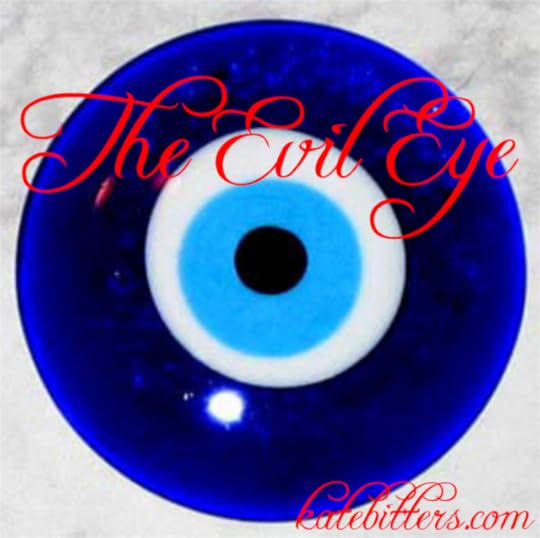
It seems more like an omen than a gift. I twist the bead around in my fingers, spinning it back so it looks away from me, then forward. The iris blazes pale blue—blue like arctic ice, or the lips of snow fairies. It hangs in the center of the bead with a dark navy pupil, and is surrounded by a ring of white on a backdrop of cobalt blue. The rings of blue glitter in the candlelight. I shudder and set the bead on my wooden table.
It stares. But what else would an evil eye talisman do?
When my uncle handed me the petite package this past afternoon, I had hoped it was a necklace or maybe a jade ring from his travels to South America. Something warm and easy on the eye. Something to carry me away from the bitter cold of this place.
“You’ll need this,” was all he said when he thrust the package into my hands. Before I could respond, he turned on his heels and tromped away, snow crunching under the treads of seal skin boots. I remember watching him and pulling my cloak closer as a chill slithered across my skin.
I shake the icy thought and am reminded of the fire dying in its grate. My cottage is so cold that I can see every puff of breath as I arise from my stool and cross the room to tend the meager flame. I blow on it, add another log from the pile, and watch the orange fingers stroke the new wood and begin to nibble at it. A cast iron pot hangs over the fire and I tip the lid up to stir the stew.
Stew for one.
I’ve lived alone since I was eighteen, over ten years now. No sensible man marries the village witch. Such a move is not great for one’s reputation.
But I prefer it this way—on my own, receiving occasional visitors that seek a healing spell or a good luck charm to aid in the next polar bear hunt. I mostly have a harmonious relationship with the villagers in my little town, but I’ve noticed an increase in tension lately. More and more people seem to cross to the other side of the street when they see me walking to market. And I’ve noticed anti-witch amulets popping up above people’s doors.
All this paranoia is likely the result of a recent string of witch attacks in Copenhagen, but that’s a thousand miles away and I’ve never associated with the witches of the black cross. Bad apples, all of them.
A rustling at the door snaps me out of my thoughts. I’m usually not bothered by the bumps and whispers of the night, but the evil eye on my dinner table has me on edge. I glance at it. It seems larger than before, and brighter. I decide it’s a trick of the light and turn back toward my stew pot.It’s bubbling and spitting ginger-flavored steam. I raise the lid again, decide that it’s ready, and fill my bowl to the brim with rabbit-vegetable stew. The evil eye is waiting when I return to the table.There’s no denying it now: the eye has grown to the size of a partridge egg and is beaming glassy blue across the table. I watch it as I eat.
A scrape at the door; a knock. I nearly spill the hot stew as I lurch to my feet.
“Who is it?” I call and start toward the door. Before I can reach the peephole to take a look outside, the door is kicked from its hinges and flies toward me. I duck to the side as the wooden missile hurls past me; in barges three of the largest humans I’ve ever seen. Two men and a woman, all clad in inky black uniforms with a blazing red flame stamped on their shoulder guards.
Venros. Witch hunters.
I scream and run toward the fire. Maybe I can conjure a quick spell. But they are swift. One of the men catches me by the arm and pulls me toward him. He pins my hands behind my back and pirouettes me around toward the other Venros.
“We’ve had it with your witchcraft, creature. It’s time for you to answer for your crimes.”
“I’ve done nothing wrong,” I shout. “I’ve not harmed a soul! Leave me be. Get out of here!”
The trio laughs. “We’ll leave all right,” the female Venro curls a lip at me. “As soon as we burn the warty witch flesh from your bones.”
She takes a step forward. Over her shoulder, I notice the evil eye beaming like a tiny star on my tabletop. Its light grows and begins to concentrate in three distinct points. It crackles and burgeons with blue luminescence.
The Venros don’t notice. Their cruel eyes are fixed on me; they lick their lips as they imagine me burning.
A concussive blast. The three points of light from the evil eye burst into the room, slicing clean holes through the Venros’ torsos. Their eyes switch from cruelty to shock in a millisecond. Mouths hang open as they feel the warmth of their organs slip out of their bodies and onto the cottage floor.
Simultaneously, the Venros collapse and their bodies melt before my eyes. Only a pile of black cloaks remain.
I straighten and catch my breath. My ears still ring from the explosion. I stoop, pick up the piles of clothing, and dump them into the fire. The fire moans and grows fat; the faint smell of oil wafts into the room. I watch the flames for a minute, then turn toward my dinner table. The evil eye has shrunk down to the same size it was this afternoon. Just a glossy bead, looking at me with an unblinking stare. I pick it up and press my lips to it. I must remember to thank my uncle.

Kate Bitters is a freelance writer, marketer, and author of Elmer Left and Ten Thousand Lines. She is writing a story a week in 2015-2016 on the Bitter Blog. Subscribe to follow her journey.

It seems more like an omen than a gift. I twist the bead around in my fingers, spinning it back so it looks away from me, then forward. The iris blazes pale blue—blue like arctic ice, or the lips of snow fairies. It hangs in the center of the bead with a dark navy pupil, and is surrounded by a ring of white on a backdrop of cobalt blue. The rings of blue glitter in the candlelight. I shudder and set the bead on my wooden table.
It stares. But what else would an evil eye talisman do?
When my uncle handed me the petite package this past afternoon, I had hoped it was a necklace or maybe a jade ring from his travels to South America. Something warm and easy on the eye. Something to carry me away from the bitter cold of this place.
“You’ll need this,” was all he said when he thrust the package into my hands. Before I could respond, he turned on his heels and tromped away, snow crunching under the treads of seal skin boots. I remember watching him and pulling my cloak closer as a chill slithered across my skin.
I shake the icy thought and am reminded of the fire dying in its grate. My cottage is so cold that I can see every puff of breath as I arise from my stool and cross the room to tend the meager flame. I blow on it, add another log from the pile, and watch the orange fingers stroke the new wood and begin to nibble at it. A cast iron pot hangs over the fire and I tip the lid up to stir the stew.
Stew for one.
I’ve lived alone since I was eighteen, over ten years now. No sensible man marries the village witch. Such a move is not great for one’s reputation.
But I prefer it this way—on my own, receiving occasional visitors that seek a healing spell or a good luck charm to aid in the next polar bear hunt. I mostly have a harmonious relationship with the villagers in my little town, but I’ve noticed an increase in tension lately. More and more people seem to cross to the other side of the street when they see me walking to market. And I’ve noticed anti-witch amulets popping up above people’s doors.
All this paranoia is likely the result of a recent string of witch attacks in Copenhagen, but that’s a thousand miles away and I’ve never associated with the witches of the black cross. Bad apples, all of them.
A rustling at the door snaps me out of my thoughts. I’m usually not bothered by the bumps and whispers of the night, but the evil eye on my dinner table has me on edge. I glance at it. It seems larger than before, and brighter. I decide it’s a trick of the light and turn back toward my stew pot.It’s bubbling and spitting ginger-flavored steam. I raise the lid again, decide that it’s ready, and fill my bowl to the brim with rabbit-vegetable stew. The evil eye is waiting when I return to the table.There’s no denying it now: the eye has grown to the size of a partridge egg and is beaming glassy blue across the table. I watch it as I eat.
A scrape at the door; a knock. I nearly spill the hot stew as I lurch to my feet.
“Who is it?” I call and start toward the door. Before I can reach the peephole to take a look outside, the door is kicked from its hinges and flies toward me. I duck to the side as the wooden missile hurls past me; in barges three of the largest humans I’ve ever seen. Two men and a woman, all clad in inky black uniforms with a blazing red flame stamped on their shoulder guards.
Venros. Witch hunters.
I scream and run toward the fire. Maybe I can conjure a quick spell. But they are swift. One of the men catches me by the arm and pulls me toward him. He pins my hands behind my back and pirouettes me around toward the other Venros.
“We’ve had it with your witchcraft, creature. It’s time for you to answer for your crimes.”
“I’ve done nothing wrong,” I shout. “I’ve not harmed a soul! Leave me be. Get out of here!”
The trio laughs. “We’ll leave all right,” the female Venro curls a lip at me. “As soon as we burn the warty witch flesh from your bones.”
She takes a step forward. Over her shoulder, I notice the evil eye beaming like a tiny star on my tabletop. Its light grows and begins to concentrate in three distinct points. It crackles and burgeons with blue luminescence.
The Venros don’t notice. Their cruel eyes are fixed on me; they lick their lips as they imagine me burning.
A concussive blast. The three points of light from the evil eye burst into the room, slicing clean holes through the Venros’ torsos. Their eyes switch from cruelty to shock in a millisecond. Mouths hang open as they feel the warmth of their organs slip out of their bodies and onto the cottage floor.
Simultaneously, the Venros collapse and their bodies melt before my eyes. Only a pile of black cloaks remain.
I straighten and catch my breath. My ears still ring from the explosion. I stoop, pick up the piles of clothing, and dump them into the fire. The fire moans and grows fat; the faint smell of oil wafts into the room. I watch the flames for a minute, then turn toward my dinner table. The evil eye has shrunk down to the same size it was this afternoon. Just a glossy bead, looking at me with an unblinking stare. I pick it up and press my lips to it. I must remember to thank my uncle.

Kate Bitters is a freelance writer, marketer, and author of Elmer Left and Ten Thousand Lines. She is writing a story a week in 2015-2016 on the Bitter Blog. Subscribe to follow her journey.
Published on December 08, 2015 18:30
December 1, 2015
Billboard Man Wore a Bowler Hat [Story #4]
I'm writing a story a week for 52 weeks. This is story #4.Thank you for subscribing to the Bitter Blog.
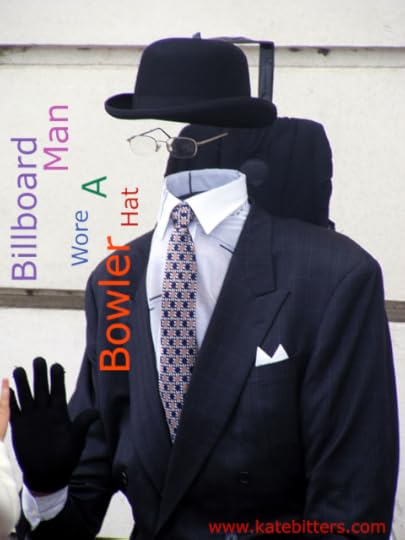
Billboard Man wore a bowler hat and loose-fitting black slacks because that’s what they told him to wear. He walked uphill, grasping a leather attaché case and watching images swim in and out of his vision. Long-lasting aloe lotion. A high-tech raincoat. Whiskey snifters. A trailer for Shoot-Em-Up III: The Taming.
Billboard Man made a mental note to buy the lotion. The note was recorded and marked with a timer that would alert him after work.
He continued walking uphill. He noticed someone pass him on the right. A woman. She wore violet jeans and a billowy sweater. Last season’s colors, Billboard Man noted. He returned to the stream of goods and services that slipped past his eyes.
At the top of the hill, a covered bus stop waited. The woman in the billowy sweater was there; she glanced over to Billboard Man and made a clucking sound with her tongue.
“Still watching the stream, eh? I was addicted too. Gave that shit up last year. Wasn’t easy.”
Billboard Man blinked at the woman. An ad for Herbal Flurry shampoo exited his vision. “You quit the stream?” His voice quavered; he looked around to make sure no one was listening. “But everyone’s on the stream. It’s…it’s unpatriotic to get off it.”
Ms. Violet Jeans shook her head. “Unpatriotic, my ass. I feel one-hundred percent better after purging my system of that thing.”
Eyes still wide, Billboard Man leaned forward, an ad for Dandy Brand Cat Food, now available in snack pouches! leaned with him. “But weren’t you scared? Didn’t you worry about what you might be missing?” He shot her an incredulous look. “Didn’t you wonder what you’d become?”
“I did. And yes, it was scary at first, but I’ll never go back to the stream. You should give it a shot.”
***
That night, Billboard Man rubbed his hands down with new aloe lotion and sat back in his leather armchair. A measure of whiskey sat on the table beside him, sitting quietly in a stylish snifter glass. Billboard Man picked up the snifter glass, gave the liquid a swirl. “Maybe I should unplug. For just a while. What could it hurt?”
He took a deep breath and disconnected from the stream. The images zipped out of his vision and Billboard Man sat, staring at the wall, growing accustomed to the dead air. He arose, walked to his bathroom, and turned on a light.
An unfamiliar face stared back at him. It was pink and smooth, like a doll. He began tracing the face in the mirror, starting with the eyes and finishing with the mouth. The silence around him was heavy and itchy, like the wool sweater he once tolerated during the two months it was in fashion. He couldn’t stand the quiet.
Billboard Man ran back to his easy chair and snifter of whiskey. He sat down; he plugged in. The chatter of advertisements filled his ears; a riot of colors bombarded his vision. He sighed and took a drink.
“Maybe tomorrow I’ll unplug,” he said to his whiskey glass. “Maybe tomorrow.”

Kate Bitters is a freelance writer, marketer, and author of Elmer Left and Ten Thousand Lines. She is writing a story a week in 2015-2016 on the Bitter Blog. Subscribe to follow her journey.
Here's a bonus image for you. Check out this old ad from London:

Billboard Man wore a bowler hat and loose-fitting black slacks because that’s what they told him to wear. He walked uphill, grasping a leather attaché case and watching images swim in and out of his vision. Long-lasting aloe lotion. A high-tech raincoat. Whiskey snifters. A trailer for Shoot-Em-Up III: The Taming.
Billboard Man made a mental note to buy the lotion. The note was recorded and marked with a timer that would alert him after work.
He continued walking uphill. He noticed someone pass him on the right. A woman. She wore violet jeans and a billowy sweater. Last season’s colors, Billboard Man noted. He returned to the stream of goods and services that slipped past his eyes.
At the top of the hill, a covered bus stop waited. The woman in the billowy sweater was there; she glanced over to Billboard Man and made a clucking sound with her tongue.
“Still watching the stream, eh? I was addicted too. Gave that shit up last year. Wasn’t easy.”
Billboard Man blinked at the woman. An ad for Herbal Flurry shampoo exited his vision. “You quit the stream?” His voice quavered; he looked around to make sure no one was listening. “But everyone’s on the stream. It’s…it’s unpatriotic to get off it.”
Ms. Violet Jeans shook her head. “Unpatriotic, my ass. I feel one-hundred percent better after purging my system of that thing.”
Eyes still wide, Billboard Man leaned forward, an ad for Dandy Brand Cat Food, now available in snack pouches! leaned with him. “But weren’t you scared? Didn’t you worry about what you might be missing?” He shot her an incredulous look. “Didn’t you wonder what you’d become?”
“I did. And yes, it was scary at first, but I’ll never go back to the stream. You should give it a shot.”
***
That night, Billboard Man rubbed his hands down with new aloe lotion and sat back in his leather armchair. A measure of whiskey sat on the table beside him, sitting quietly in a stylish snifter glass. Billboard Man picked up the snifter glass, gave the liquid a swirl. “Maybe I should unplug. For just a while. What could it hurt?”
He took a deep breath and disconnected from the stream. The images zipped out of his vision and Billboard Man sat, staring at the wall, growing accustomed to the dead air. He arose, walked to his bathroom, and turned on a light.
An unfamiliar face stared back at him. It was pink and smooth, like a doll. He began tracing the face in the mirror, starting with the eyes and finishing with the mouth. The silence around him was heavy and itchy, like the wool sweater he once tolerated during the two months it was in fashion. He couldn’t stand the quiet.
Billboard Man ran back to his easy chair and snifter of whiskey. He sat down; he plugged in. The chatter of advertisements filled his ears; a riot of colors bombarded his vision. He sighed and took a drink.
“Maybe tomorrow I’ll unplug,” he said to his whiskey glass. “Maybe tomorrow.”

Kate Bitters is a freelance writer, marketer, and author of Elmer Left and Ten Thousand Lines. She is writing a story a week in 2015-2016 on the Bitter Blog. Subscribe to follow her journey.
Here's a bonus image for you. Check out this old ad from London:

Published on December 01, 2015 18:06
November 24, 2015
The Suspicious Garden [Story #3]
Week 3 of 52 weeks of stories. Stay tuned and subscribe!
Once again, I was inspired to write a story about the aftermath of the Paris tragedy. It’s a children’s story with a big message.
Little humans: There are lots of big words in this story! Ask your big human to explain them to you and then discuss the meaning of this story (This is also a message for big humans *nudge*)
Big humans: There is a physics theory that goes like this: Every moment in time is infinite and is experienced forever. I.e. if you eat a chocolate ice cream cone when you’re five years old, you will forever be five years old, eating chocolate ice cream. With that in mind, I ask that you reach out into the space jelly and find that slice of your self that enjoys talking animal stories and introduce that self to the part of you that understands complex metaphors. There’s no reason they can’t shake hands and be friends.
The Suspicious Garden
Rabbit could smell the trouble before he saw it. An acrid cloud hung around Briar Street. It stung rabbit’s nostrils and made the tan fur on his muzzle feel damp and itchy.
What in the name of this great, green earth is that?
Rabbit was a curious fellow. He was the first in the litter to leave his mother’s den, the first to explore the sunny meadow. And he was the first to abandon the meadow and venture off over the hillside. At the start, Rabbit only wanted to see what lay on the other side of the hill. He found a pond with some turtles and reeds that rattled and scraped when the wind meandered through them. Rabbit liked the turtles and the rattling reeds, but he quickly grew bored of them. Turtles are not big talkers, you know.
So, Rabbit moved on. Over the next hill. Through a ravine. Over another hill. Then another.Days passed. Weeks. At some point, Rabbit realized he was on an adventure. The thought made him smile and wriggle his cotton ball tail. After a few months, Rabbit ended up in the city, on the edge of Briar Street.
“Oh, that smell!” Rabbit said aloud, hopping cautiously forward. “It reminds me of rotting leaves and porcupine dung.”
At this point, most rabbits would have turned tail and fled from the noxious smell, but not Rabbit. He pressed onward, one hop at a time. Soon, he reached a battered wooden fence and wriggled through the slats. The heavy air hung around him like a wet coat of fur.
Rabbit looked around. Plants everywhere. All different colors and sizes. Flowers, vines, fruits, grasses. They tumbled over one another in a raucous heap of life.
Except they didn’t seem too lively. Many of the plants’ leaves were shriveled and their heads were heavy and bowed. The greens were mottled with disease; the flowers looked dull and listless.
“This is the gloomiest garden I’ve ever seen,” said Rabbit, picking his way through a patch of brambles. “I wonder what happened here.”
“It’s Vine’s fault,” a voice above his head made Rabbit pause, look up. A cluster of raspberries hung above him. When the berries saw Rabbit looking at them, they all began chattering and bouncing up and down on the bush.
“It’s the Creeping Charlie vine, to be precise.”
“He chokes out the rest of us.”
“It’s hard to grow when Vine takes all your nutrients.”
“Doesn’t leave anything for the rest of us, he doesn’t.”
“A greedy vine; truly greedy.”
Rabbit held up a paw. The chattering stopped. “I’m sorry Vine is crowding you out, Raspberries. That must be the reason this garden smells so foul.”
The berries bounced up and down in agreement.
“I will confront Vine,” Rabbit said, “and ask him why he must be so greedy.”
“Thank you, Rabbit. Thank you.”
Rabbit hopped forward and it wasn’t long until his foot caught on the Creeping Charlie vine and he tumbled forward.
“Vine!” Rabbit scolded, untangling himself and turning to face the sprawling plant. “I’ve heard you’re up to some nasty things in this garden. You’re taking over and leaving no room for the poor raspberries to breathe.”
“It’s not true!” said Vine, undulating like a snake across the ground. “I am a victim, not a trouble-maker. It’s the sunflowers who are to blame for the putrid smell in the garden. They grow so tall and spread their petals so wide that they swallow the sun. There’s no sunshine left for any of us down here.”
“Hmm,” said Rabbit, considering what Vine had said. “Plants need sunlight to grow and flourish. I can understand your problem.”
“Thank you,” said Vine. “Can you please go over there and talk to the sunflowers. They refuse to stoop their heads to talk to a lowly ground-crawler like me.”
“I will do that,” said Rabbit. With a determined hop, Rabbit headed toward a group of sunflowers huddled together in a tall formation. When Rabbit approached, he felt a shadow pass over his face. “I see what Vine meant,” he said aloud, “you sunflowers really do block the sun from everyone else.”
“We’re not to blame!” one of the sunflowers protested, bending her head toward Rabbit.
“Then who is to blame, Sunflower?” Rabbit asked, jutting his nose out defiantly. “A lack of sunshine would make any garden wilt and grow rancid.”
“So would a lack of pollinators!” cried Sunflower, tossing her head. “We have a hard time up here, you know. Milkweed is stealing all the butterflies. None of the butterflies bother to flutter up here because they are all enchanted by Milkweed’s flower. We can’t compete!”
“I’m sorry to hear that,” Rabbit said, dropping his chin. “I know flowers need butterflies or other pollinators to help them make more flowers. I can understand your distress.”
“Thank you, Rabbit,” said Sunflower. “We are afraid that we won’t be able to make more sunflowers because the butterflies turn their noses up at us.”
“I understand,” Rabbit replied. “I will go talk to Milkweed.”
Rabbit set out for the edge of the garden, where a grove of milkweed plants fanned their bushy flowers.
“You’re causing quite the disturbance in this garden, aren’t you, Milkweed?” Rabbit said as he approached the plants. “Sunflower says you’re stealing all the butterflies.”
“We can’t help it if the butterflies like us,” Milkweed ruffled her leaves defensively. “It’s always been that way. But I’m telling you, Rabbit, we’re not to blame for the garden’s discord.”
“Oh?” said Rabbit, frowning skeptically. “If the butterflies don’t pollinate the sunflowers, who will?”
“Bees!” Milkweed cried. “Bees are excellent pollinators and Lavender hogs them all for himself. There’s always a swarm buzzing over there. I wish we had that many butterflies fluttering around us. Go see for yourself, Rabbit.”
“Okay,” said Rabbit. “I will do that.”
Rabbit was growing frustrated by all the blame that spilled out of the garden, but he did his best to keep a level head. “I will get to the bottom of this,” Rabbit said to himself as he hopped toward the lavender.
“Lavender!” Rabbit called when he was within earshot. “I have a bone to pick with you.”
“What is it?” Lavender asked, swaying with the breeze that tumbled through the garden. “I’ve done nothing wrong.”
“That’s not what Milkweed claims. She tells me that you’re stealing all the bees in the garden, that you won’t share them with anyone else.”
“That’s a dirty lie!” Lavender growled. “The bees come here on their own accord. I do nothing to keep them from the other plants. If you’re looking for someone to blame for the garden’s rottenness, look no further than the raspberries.”
“Raspberries?” Rabbit fumed. “But it was the raspberries that sent me hopping around this garden in the first place. They told me Vine was to blame for monopolizing the garden’s nutrients.”
“That may be true,” Lavender responded, “but the raspberries are also greedy. They grow sweet fruit that the humans love. Because of that, the humans spend extra time pruning and taking care of them. No one else in the garden gets that kind of attention.”
“Oh dear,” said Rabbit, shaking his head. “I can understand the frustration the rest of the garden must feel when Raspberry gets the lion’s share of the attention.”
“Yes,” said Lavender. “It creates a lot of jealousy in the garden.”Rabbit nodded. He didn’t know what else to say to Lavender, so he hopped away. Rabbit reached the exact center of the garden and sat for a while, fiddling with his paws. He was full of anxiety and confusion.
“I’m afraid I didn’t solve anything for the pestilent garden,” Rabbit moaned. “Every plant blames another for the garden’s problems. They’re all so full of vitriol, that they cannot see their own flaws. What, oh what, can I do?”
Rabbit stood thinking about the problem for several minutes, wringing his paws and twitching his nose. As he pondered, Rabbit could hear the negative chatter of the surrounding plants. They complained and grumbled; they shot each other scathing looks. The sky above seemed dark and dead.Rabbit looked up. Something drifted past him and fluttered upward. The flying creature circled once in the air and alit on the head of Sunflower. It was a butterfly.
A few seconds later, another butterfly joined the first. Rabbit’s jaw dropped. He began looking around. Bees hummed quietly by Milkweed and Raspberry. A quiet stream of sunlight broke through the clouds and filtered down onto Vine’s sprawling body.
Yet, the grumbling continued. The blaming. The hate-filled words.
Rabbit drew in a deep breath and let out a scream: “STOP!”
The sound echoed across the garden’s din; the chattering halted.
“Take a look around you, plants. There is plenty for all. Lots of butterflies and bees, an abundance of sunlight and nutrients in the soil. And I’m certain your human cares for all of you, even though she may favor Raspberry.”
Rabbit looked around at the plants. “Why all the suspicion and malice? You’re all blaming each other for what you think might happen in the garden. You’re so busy feeling threatened that you’re forgetting to enjoy the sunshine and the buzzing bees.”
“Oh yeah?” Sunflower sniffed. “I’m not imagining anything. Milkweed really does take the bulk of the butterflies for herself.”
“That may be,” said Rabbit, “but don’t you take a little extra sunshine?”
“I might,” Sunflower said, raising her head indignantly, “but there’s plenty left over for the others.”
“Precisely,” Rabbit smiled. “There’s enough for all, you just have to learn to share and be welcoming to others, despite your differences. After all, you all want the same things—to grow and flourish, to create seedlings to carry on your family name. Isn’t that right?”
A few plants nodded. They sat quietly, thinking about the wisdom in Rabbit’s words. As they sat, the tiny trickle of sunlight grew wider, stronger. The hanging clouds blew away in a strong breeze. The garden was bathed in a friendly afternoon glow.
“I’m sorry,” Vine said to Sunflower. In my heart, I knew that you weren’t hogging the sunlight.
“And I’m sorry to you, Vine,” Raspberry called down from the bush. “You don’t really hog the entire ground.”
“Sorry,” the plants said to each other. “We were wrong to judge. We were wrong to hate.”
Rabbit listened to the chorus of apologies and smiled. The overhead sun shone on his nose and he wriggled it delightedly. He stretched one leg, then the other. Slowly, silently he hopped away.

Kate Bitters is a freelance writer, marketer, and author of Elmer Left and Ten Thousand Lines. She is writing a story a week in 2015-2016 on the Bitter Blog. Subscribe to follow her journey.
Once again, I was inspired to write a story about the aftermath of the Paris tragedy. It’s a children’s story with a big message.
Little humans: There are lots of big words in this story! Ask your big human to explain them to you and then discuss the meaning of this story (This is also a message for big humans *nudge*)
Big humans: There is a physics theory that goes like this: Every moment in time is infinite and is experienced forever. I.e. if you eat a chocolate ice cream cone when you’re five years old, you will forever be five years old, eating chocolate ice cream. With that in mind, I ask that you reach out into the space jelly and find that slice of your self that enjoys talking animal stories and introduce that self to the part of you that understands complex metaphors. There’s no reason they can’t shake hands and be friends.

The Suspicious Garden
Rabbit could smell the trouble before he saw it. An acrid cloud hung around Briar Street. It stung rabbit’s nostrils and made the tan fur on his muzzle feel damp and itchy.
What in the name of this great, green earth is that?
Rabbit was a curious fellow. He was the first in the litter to leave his mother’s den, the first to explore the sunny meadow. And he was the first to abandon the meadow and venture off over the hillside. At the start, Rabbit only wanted to see what lay on the other side of the hill. He found a pond with some turtles and reeds that rattled and scraped when the wind meandered through them. Rabbit liked the turtles and the rattling reeds, but he quickly grew bored of them. Turtles are not big talkers, you know.
So, Rabbit moved on. Over the next hill. Through a ravine. Over another hill. Then another.Days passed. Weeks. At some point, Rabbit realized he was on an adventure. The thought made him smile and wriggle his cotton ball tail. After a few months, Rabbit ended up in the city, on the edge of Briar Street.
“Oh, that smell!” Rabbit said aloud, hopping cautiously forward. “It reminds me of rotting leaves and porcupine dung.”
At this point, most rabbits would have turned tail and fled from the noxious smell, but not Rabbit. He pressed onward, one hop at a time. Soon, he reached a battered wooden fence and wriggled through the slats. The heavy air hung around him like a wet coat of fur.
Rabbit looked around. Plants everywhere. All different colors and sizes. Flowers, vines, fruits, grasses. They tumbled over one another in a raucous heap of life.
Except they didn’t seem too lively. Many of the plants’ leaves were shriveled and their heads were heavy and bowed. The greens were mottled with disease; the flowers looked dull and listless.
“This is the gloomiest garden I’ve ever seen,” said Rabbit, picking his way through a patch of brambles. “I wonder what happened here.”
“It’s Vine’s fault,” a voice above his head made Rabbit pause, look up. A cluster of raspberries hung above him. When the berries saw Rabbit looking at them, they all began chattering and bouncing up and down on the bush.
“It’s the Creeping Charlie vine, to be precise.”
“He chokes out the rest of us.”
“It’s hard to grow when Vine takes all your nutrients.”
“Doesn’t leave anything for the rest of us, he doesn’t.”
“A greedy vine; truly greedy.”
Rabbit held up a paw. The chattering stopped. “I’m sorry Vine is crowding you out, Raspberries. That must be the reason this garden smells so foul.”
The berries bounced up and down in agreement.
“I will confront Vine,” Rabbit said, “and ask him why he must be so greedy.”
“Thank you, Rabbit. Thank you.”
Rabbit hopped forward and it wasn’t long until his foot caught on the Creeping Charlie vine and he tumbled forward.
“Vine!” Rabbit scolded, untangling himself and turning to face the sprawling plant. “I’ve heard you’re up to some nasty things in this garden. You’re taking over and leaving no room for the poor raspberries to breathe.”
“It’s not true!” said Vine, undulating like a snake across the ground. “I am a victim, not a trouble-maker. It’s the sunflowers who are to blame for the putrid smell in the garden. They grow so tall and spread their petals so wide that they swallow the sun. There’s no sunshine left for any of us down here.”
“Hmm,” said Rabbit, considering what Vine had said. “Plants need sunlight to grow and flourish. I can understand your problem.”
“Thank you,” said Vine. “Can you please go over there and talk to the sunflowers. They refuse to stoop their heads to talk to a lowly ground-crawler like me.”
“I will do that,” said Rabbit. With a determined hop, Rabbit headed toward a group of sunflowers huddled together in a tall formation. When Rabbit approached, he felt a shadow pass over his face. “I see what Vine meant,” he said aloud, “you sunflowers really do block the sun from everyone else.”
“We’re not to blame!” one of the sunflowers protested, bending her head toward Rabbit.
“Then who is to blame, Sunflower?” Rabbit asked, jutting his nose out defiantly. “A lack of sunshine would make any garden wilt and grow rancid.”
“So would a lack of pollinators!” cried Sunflower, tossing her head. “We have a hard time up here, you know. Milkweed is stealing all the butterflies. None of the butterflies bother to flutter up here because they are all enchanted by Milkweed’s flower. We can’t compete!”
“I’m sorry to hear that,” Rabbit said, dropping his chin. “I know flowers need butterflies or other pollinators to help them make more flowers. I can understand your distress.”
“Thank you, Rabbit,” said Sunflower. “We are afraid that we won’t be able to make more sunflowers because the butterflies turn their noses up at us.”
“I understand,” Rabbit replied. “I will go talk to Milkweed.”
Rabbit set out for the edge of the garden, where a grove of milkweed plants fanned their bushy flowers.
“You’re causing quite the disturbance in this garden, aren’t you, Milkweed?” Rabbit said as he approached the plants. “Sunflower says you’re stealing all the butterflies.”
“We can’t help it if the butterflies like us,” Milkweed ruffled her leaves defensively. “It’s always been that way. But I’m telling you, Rabbit, we’re not to blame for the garden’s discord.”
“Oh?” said Rabbit, frowning skeptically. “If the butterflies don’t pollinate the sunflowers, who will?”
“Bees!” Milkweed cried. “Bees are excellent pollinators and Lavender hogs them all for himself. There’s always a swarm buzzing over there. I wish we had that many butterflies fluttering around us. Go see for yourself, Rabbit.”
“Okay,” said Rabbit. “I will do that.”
Rabbit was growing frustrated by all the blame that spilled out of the garden, but he did his best to keep a level head. “I will get to the bottom of this,” Rabbit said to himself as he hopped toward the lavender.
“Lavender!” Rabbit called when he was within earshot. “I have a bone to pick with you.”
“What is it?” Lavender asked, swaying with the breeze that tumbled through the garden. “I’ve done nothing wrong.”
“That’s not what Milkweed claims. She tells me that you’re stealing all the bees in the garden, that you won’t share them with anyone else.”
“That’s a dirty lie!” Lavender growled. “The bees come here on their own accord. I do nothing to keep them from the other plants. If you’re looking for someone to blame for the garden’s rottenness, look no further than the raspberries.”
“Raspberries?” Rabbit fumed. “But it was the raspberries that sent me hopping around this garden in the first place. They told me Vine was to blame for monopolizing the garden’s nutrients.”
“That may be true,” Lavender responded, “but the raspberries are also greedy. They grow sweet fruit that the humans love. Because of that, the humans spend extra time pruning and taking care of them. No one else in the garden gets that kind of attention.”
“Oh dear,” said Rabbit, shaking his head. “I can understand the frustration the rest of the garden must feel when Raspberry gets the lion’s share of the attention.”
“Yes,” said Lavender. “It creates a lot of jealousy in the garden.”Rabbit nodded. He didn’t know what else to say to Lavender, so he hopped away. Rabbit reached the exact center of the garden and sat for a while, fiddling with his paws. He was full of anxiety and confusion.
“I’m afraid I didn’t solve anything for the pestilent garden,” Rabbit moaned. “Every plant blames another for the garden’s problems. They’re all so full of vitriol, that they cannot see their own flaws. What, oh what, can I do?”
Rabbit stood thinking about the problem for several minutes, wringing his paws and twitching his nose. As he pondered, Rabbit could hear the negative chatter of the surrounding plants. They complained and grumbled; they shot each other scathing looks. The sky above seemed dark and dead.Rabbit looked up. Something drifted past him and fluttered upward. The flying creature circled once in the air and alit on the head of Sunflower. It was a butterfly.
A few seconds later, another butterfly joined the first. Rabbit’s jaw dropped. He began looking around. Bees hummed quietly by Milkweed and Raspberry. A quiet stream of sunlight broke through the clouds and filtered down onto Vine’s sprawling body.
Yet, the grumbling continued. The blaming. The hate-filled words.
Rabbit drew in a deep breath and let out a scream: “STOP!”
The sound echoed across the garden’s din; the chattering halted.
“Take a look around you, plants. There is plenty for all. Lots of butterflies and bees, an abundance of sunlight and nutrients in the soil. And I’m certain your human cares for all of you, even though she may favor Raspberry.”
Rabbit looked around at the plants. “Why all the suspicion and malice? You’re all blaming each other for what you think might happen in the garden. You’re so busy feeling threatened that you’re forgetting to enjoy the sunshine and the buzzing bees.”
“Oh yeah?” Sunflower sniffed. “I’m not imagining anything. Milkweed really does take the bulk of the butterflies for herself.”
“That may be,” said Rabbit, “but don’t you take a little extra sunshine?”
“I might,” Sunflower said, raising her head indignantly, “but there’s plenty left over for the others.”
“Precisely,” Rabbit smiled. “There’s enough for all, you just have to learn to share and be welcoming to others, despite your differences. After all, you all want the same things—to grow and flourish, to create seedlings to carry on your family name. Isn’t that right?”
A few plants nodded. They sat quietly, thinking about the wisdom in Rabbit’s words. As they sat, the tiny trickle of sunlight grew wider, stronger. The hanging clouds blew away in a strong breeze. The garden was bathed in a friendly afternoon glow.
“I’m sorry,” Vine said to Sunflower. In my heart, I knew that you weren’t hogging the sunlight.
“And I’m sorry to you, Vine,” Raspberry called down from the bush. “You don’t really hog the entire ground.”
“Sorry,” the plants said to each other. “We were wrong to judge. We were wrong to hate.”
Rabbit listened to the chorus of apologies and smiled. The overhead sun shone on his nose and he wriggled it delightedly. He stretched one leg, then the other. Slowly, silently he hopped away.

Kate Bitters is a freelance writer, marketer, and author of Elmer Left and Ten Thousand Lines. She is writing a story a week in 2015-2016 on the Bitter Blog. Subscribe to follow her journey.
Published on November 24, 2015 04:05
November 16, 2015
Not All Bears [Story #2]
I'm writing a story a week for 52 weeks. This is story #2.
Not All Bears was grimly inspired by the November 13th tragedy in Paris. I am saddened by the lives lost, and I fear the inevitable backlash against the people who are only associated with the killers vaguely, through a religion that does not generally preach violence.
Not All BearsKate Bitters
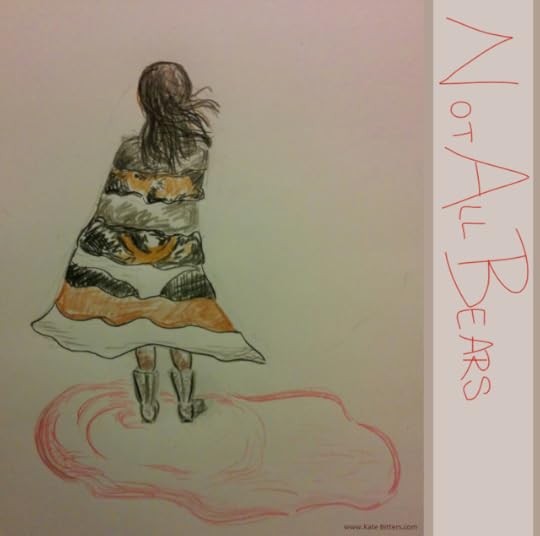
On the night Grizzly killed my family the sky was the color of wet coal. The moon had hunched her shoulders and was looking away from the tundra, muttering to herself about the November chill. Wind gusted across the rugged land, dancing across dry prairie grasses and making them rattle like my little brother’s favorite toy.
Many people were already asleep in our village that night, but my family was not. We were having a celebration. Just three days earlier, my mother had given birth to a baby girl. My sister. I loved her immediately—her shock of dark hair, her tiny mouth and fingers, even her screaming lungs were beautiful to me.
“She’s got a lot to say,” my father had laughed. “You would too if you were cooped up for nine months with no one to talk to.”
I remember smiling and stroking my sister’s belly. “We’ll go on lots of adventures, won’t we, father?”
“Just don’t leave out your brother. He likes adventures too, you know.”
On the night Grizzly killed my family, I was thinking about my future adventures with my sister. We would travel across the jungles of South America and the great Australian dessert. We would make friends with a zebra in Africa and ride on yaks in the mountainous parts of Asia. We would spend years away from the Arctic tundra.
But we would always come back. This was home.
As I was day dreaming, Grizzly stalked and my family sang. Everyone was in our little home that night—two uncles, three aunts, a cousin, Grandma and Grandpa, mother, father, brother, and my brand new sister. We sang our favorite songs and clapped to the rhythm. My aunts and uncles had cooked a feast that night and the house smelled of bannock and caribou stew and pan-fried ptarmigan.
I remember inhaling the fragrances and exhaling a smile. We were cozy, despite the whipping wind. I shivered as I thought about stepping out into the cold. That’s where the outhouse was and I had had three glasses of water so far that night.
On my way out the door, I passed my sister, who was wrapped in furs and held firmly in my mother’s arms. I paused and kissed her pink forehead. Her skin was soft and smelled like new snow. “Grow up quickly,” I urged. “Then we can have our adventures.”
The waiting wind shot down my back and screeched across my ears as I hustled to the outhouse. As I opened the door, Grizzly stormed into my family’s home. I can picture the music halting, my family clinging to each other as the enraged bear burst through our wooden door and began slaughtering my family.
One by one by one. Even my sister.
It’s hard for me to imagine the rage that was boiling within the bear’s heart. It was hot enough to melt the permafrost.
After the horrible tragedy, the people in my village speculated about the bear’s motives. “It was the November wind,” some said. “Its cold fingers tickled Grizzly’s hide in just the wrong spots and sent him into a fury.”
“No,” said others, “it was the heartless new moon. Her absence reminded the bear of his runaway lover and slaughtered cubs.”
Still others—the superstitious lot—said it was the date: an unlucky Friday the 13th. But the elders took no stock in that theory; that was a white man’s invention, they said with a wave of their hands.
Me? I offer no excuses. Grizzly knew precisely what he was doing when he tore down my family’s door and murdered twelve people. Thankfully, it was over quickly. By the time I returned from the outhouse, the floorboards were soaked with blood, the neighbors were crying and wringing their hands, and Grizzly was gone. I could hear him snorting as he ran across the tundra, feet flying beneath his thick body.
The best hunters in the village wasted no time in tracking the bear and killing him. The next day, after a hasty funeral, the hunters stretched out Grizzly’s massive hide and strung it between two poles in the center of town. I looked at it and felt no closure. This wasn’t the end of my grief. My family—my world—disappeared in an instant under that monster’s claws. I would no longer feel my mother’s kiss brush my cheek or hear my father’s voice as we sat, side-by-side, ice fishing on Amaruq Lake.
I approached Grizzly’s outstretched hide; it glowed copper in the chilly sunlight. His massive head dipped toward the ground and I stooped near it. “This isn’t finished,” I whispered into his ear. “I will travel across the world. I will find members of your family and slaughter them without blinking. Your kin will suffer at my hand and I will show no mercy. This I vow to you, bear.”
Five years after I said the words, I set out to make good on my promise.
I left without much fanfare. The villagers were quiet when they gathered in the town square to watch me leave. A few of them grasped my gloved hand or patted me on the back and wished me well. I nodded at them and climbed astride Ila, the dun-colored pony that once belonged to my uncle. As Ila and I set off southward, I could feel the heavy weight of the villagers’ eyes.
I didn’t share their concern. I had been planning, preparing, training for this journey for five years. I poured over biology and ecology books that I had had mailed to the village. Whenever I found pages that related to bears or their habitats, I ripped them out of the books and kept them in a folder I’d made from caribou leather. “One of every species,” I’d mutter to myself as I flipped through the pages. “I want the whole family to suffer.”
When I set out, I took my leather folder with me, along with provisions, a traveling cloak, and a whole heap of money from my late family. The money conjured images of limp bodies and floor boards painted with human organs; I avoided touching it and used a gloved hand whenever I made a transaction. This habit earned me the nickname Gloves and I adopted the name readily, eager to drop my past life into the dust behind my feet.
The pony, the provisions, the money, and I traveled south for a long time. The tussocks spread their wild heads across the tundra, making footing difficult; we didn’t travel above a careful walk for several days. Near the end of the tenth day, the harsh tundra grasses grew softer and the ground transformed into a moss and dirt covered flatland. From the flatland, scrubby trees and bushes sprouted up haphazardly, thickening and growing taller and straighter the further south we traveled.
The pony could trot now and she carefully picked her way through fragrant pine forests and along rocky riverbanks. The land grew rugged and mountains loomed to our right. I’m not certain when we stepped across the Canadian border and into America, but eventually I noticed a subtle shift in scenery, an opening up of the land. There were prairies now, coated with a dusting of winter’s first snow. And there were forests too—pine blended with maple, oak, birch, quaking aspen. We passed a few farm houses and were making our way across the tail end of a corn field when I spotted them.
Tracks.
I yanked Ila to a halt, dismounted, and ran a gloved hand over a fresh bear track.
“You’re a big one, aren’t you?” I said to the footprint. “We’ll find you soon. Soon.”
Black Bear was easy to spot. She had nestled herself in the thick of an old butternut squash patch and was sitting down like a human, gnawing at a gourd between her paws. I tied Ila to a tree and drew my knife. With coyote footsteps I approached Black Bear; her munching halted.
“I know you’re there,” she said, swallowing a mouthful of squash and keeping her back squarely toward me. “You don’t have to kill me.”
I scoffed and took another footstep. “But I do, Mother Black Bear. It’s an act of justice.”
“Justice?” she said, turning toward me. “What justice is there in killing an innocent life?”
“Grizzly murdered my family, so I vowed I would kill his.”
“I am not Grizzly,” she said. “I avoid humans at all costs; they bring too much trouble. I’d rather spend my days eating butternut squash and raising cubs and taking naps in the ferns.”
Black Bear’s eyes brimmed with tears and I lowered my knife an inch or two.
“Please,” said the bear, “spare me, young human. I am sorry about your family, but you have to realize, that was one bear. Not all bears.”
My knife lowered another inch. But then I pictured my family and their lifeless bodies. I saw Grandfather’s face and the way his cheeks folded into a thousand lines when he laughed. “I can’t do that,” I said. “I dedicate your life to Grandfather.”
I sprang on the bear’s back and slit her throat open in one, smooth motion. Blood coated the new snow and Black Bear slumped to the side, brown eyes wide and still glossy from tears.
I wiped the knife and began carving off her hide. I cut a long strip and sewed it, crosswise, along the top of my traveling cloak. A stripe of black fur.
Ila and I continued south. We crossed long prairies and miles of rolling hills. We went through a few small towns and always stopped to spend the night indoors, away from the chill. It was easy going and it wasn’t long before the snow disappeared and the air grew humid and warm. The breeze carried an unfamiliar aroma and I breathed it in, wondering at its spice.
It was the scent of the ocean. We crested a hill and saw the gray water spread out in front of us, an endless, swaying forest. I felt my breath catch in my throat. “Ila,” I whispered to my pony, “did you ever think you’d see that, old girl?”
We didn’t pause for long. Our journey continued along the ocean’s shores, down the coast of Mexico, and into Central America. We crossed ranges of volcanoes, thick with broad-leafed plants and orchids. We slept among coffee plants and plantain trees, on powder-sand beaches, alongside thatched roof houses, and, once, underneath a covered bridge to escape the rain. When we reached Panama, people buzzed with talk of the groundbreaking of a new canal. I didn’t listen much, just asked for directions to the border.
Once we crossed into Colombia, my skin began to tingle; the hairs on my arms jumped to alert. Our quarry was close. Back in the village, I had studied Spectacled Bear and his habitat. I knew what kind of forest he liked, his favorite fruits and seeds, where he was likely to sleep.
We were traveling in the thick of a cloud forest when we spotted tracks.
I squealed; Ila tossed her head. I studied the tracks. Fresh. Huge. Leading toward a grove of palm nut trees.
When I found Spectacled Bear, he was shuffling across the forest floor, picking up palm nuts with his lips and eating them. Though I was quiet as a jaguar, he heard me coming and shimmied up the nearest tree. It bent from his weight and he clung desperately to the trunk.
“What do you want, human?”
“I’ve come here to kill you, Spectacle Bear. It’s a matter of justice.”
“There is no justice in killing the innocent. I do not understand.”
“It was Grizzly,” I said. “He slaughtered my family. And now I am on a mission to make all bears suffer.”
“But that was Grizzly acting alone,” Spectacled Bear said, craning his golden face toward me. “That was not all bears.”
I took a deep breath and held out my knife. “My mind is made up, bear. Now, come down or I will wait for you to fall.”
Spectacled Bear looked at me sadly. “Can’t you understand, human? I want the same things you want—to raise cubs, to eat cactus and bark, to nap in the branches of trees.”
My knife shook in my hand and I took a deep breath to steady it. “This one’s for Grandma,” I whispered, picturing Grandma’s warm brown eyes shining out of a fur-lined hood. I took a step back, cocked my arm back, and snapped the bowie knife forward. It cartwheeled through the air once, twice, then stuck in Spectacled Bear’s throat.
He gasped and lost his grip. When he hit the ground, the fall broke his back. A twitch, a moan. Nothing.
I skinned a strip of black and gold fur from under the bear’s throat and sewed it to my traveling cloak underneath Black Bear’s stripe. Two bears dead, but I did not pause to congratulate myself. I pressed on.
From a port city on the coast of Colombia, Ila and I found a ship bound for Australia. I paid the ticket person with a gloved hand and boarded the ship. The thought of an ocean crossing made me excited and I skipped up the ship’s gangplank, my face drowning in a smile. But as soon as the ship gathered speed and the open ocean began to rock and bash itself against the hull, my smile dropped and my insides turned to jelly. I spent most of the month-long ocean journey clutching my stomach and wishing for my mother’s strong-armed embrace.
When we docked in the Melbourne harbor, I stumbled onto land, knelt, and clutched handfuls of soil, sobbing as I picked up the dirt and dropped it again. Picked it up, dropped it. Someone brought Ila and my pack to me. I stood, brushed the dirt from my clothes, and kissed my pony’s muzzle. We rode on.
Into a eucalyptus forest this time. When I found Koala, he protested, saying, “I’m not really a bear, you know. I’m a marsupial. There’s no need to kill me in the name of revenge.”
“Then why are you called bear?” I challenged, my knife poised at his throat.
“People are careless,” he shrugged. “You mislabel things and don’t bother to fix them. You make assumptions about all bears when you’ve had a bad experience with one of them. I’ll have you know,” Koala met my stare, “Grizzly acted on his own. He is not all bears.”
“Enough from you, Koala!” I said. “Until the day humans stop calling you a bear, I will treat you as one.”
I ran my blade across Koala’s throat. His neck dropped; the eucalyptus leaf he held in his paw fluttered to the ground. “For my uncles and aunts,” I whispered.
I added a gray stripe to my traveling cloak.
It was difficult for me to return to the harbor and board another ocean-bound ship, but I knew I had no choice. My next victim lived in a string of islands, north of the Australian continent. Sun Bear.I pulled Sun Bear’s pages out of my leather folder and ran my pointer finger along her image. She was big and mean looking, with a huge head and prehistoric claws. An orange patch of fur swooped across her chest, resembling a necklace—a silly decoration for such a fierce-looking monster.
I pulled out the rest of the pages and leafed through until I found Koala. My heart fluttered when I read the word “marsupial.” Koala had been telling the truth. How had I overlooked this detail?
Because you believe what you want to believe.
The voice rose, unbidden, into my ears. I batted it away. “No,” I said aloud. “I believe what is true.”
Suit yourself.
The voice again. I crossed my arms and willed it to go away.
I found Sun Bear in the Philippines, snacking on termites. Like the other bears, she protested and pleaded. She told me Grizzly was deranged, that he was out of his mind that night, that he didn’t represent all bears.
I killed her in the name of my cousin and carved her orange necklace off her body. I sewed it to my cloak and realized for the first time that the cloak was getting heavy. I stubbornly continued to wear it, despite the tropical heat, and continued on my journey.
Next was Panda. He was difficult to find in China’s dense bamboo forests.
When Panda saw me emerge from my hiding place, brandishing the bowie knife above his plush head, his eyes grew wide and he began to sob. “My family,” he said. “Think of them. My cubs didn’t kill your family. That was an act of lunacy—a crazed bear acting alone. Grizzly is not all bears.”
It was difficult to kill Panda. I thought of his cubs tumbling across the hillsides. I thought of his mate searching the bamboo forests, calling out his name. I closed my eyes when I did it; I didn’t want to see the splash of red against his white throat.
I dedicated Panda’s life to my brother and added a black and white stripe to my cloak.
Brown Bear was even more difficult than Panda. And Polar was more difficult than Brown. I knew what they would say before I slaughtered them in the name of my mother and father; I had heard it before: Not all bears.
Grizzly was an exception, an outlier.He was troubled, deranged. Full of hate.He had a hole in his heart from the death of his cubs.He is not one of us. He is not all bears.
An outlier, an exception.Troubled, deranged.He is not one of us.He is not all bears.
Their final words echoed through my head as I made my way back to the Canadian tundra. Polar Bear’s slaying took place just north of my homeland and I didn’t have far to go. “Just one more bear to kill,” I said to Ila, patting her shoulder. “Grizzly’s runaway lover.”
Ila barely responded to my touch. She was thin now, weary from travel. And the traveling cloak was slowing her down. I wasn’t certain how much it weighed, but it felt like a musk ox pressing down on my shoulders.
Ila struggled onward. Her footsteps slowed; her breathing became labored and punctuated by coughing fits. Finally, she stopped and refused to move forward.
“Ila,” I said, “this is the last leg of our journey. We only have to find Grizzly’s lover and kill her in the name of my sister. Then, we’ll go home. I promise, Ila…”
But Ila would not move.
I dismounted, removed the pack that was strapped to Ila’s back, and put it on under the heavy traveling cloak. “I’ll carry everything, Ila. Let’s go.”
We stepped gingerly across the tundra. I could feel the weight of the cloak with every footfall. It pressed down, down.
I began to think about the cloak and what it meant. At the beginning of my journey, it was my symbol of bravery and justice. The fur pelts were stripes of honor that I carried on my back.
But now? Now the cloak’s meaning had changed for me. It felt heavy and wrathful. It reminded me of extinguished lives, of the pleading eyes of bears who only wanted to eat berries and nibble on leaves and raise their cubs. As I thought of the lives I took, the cloak dragged me down further. It was soaked in hate and vitriol. It brought me no closure. No comfort.
I collapsed under its weight and fell, face-first, into the crusty snow. I started to sob. I hardly knew myself anymore. My revenge mission had eaten a hole in my soul and it felt ragged, hollow. With every bear I killed, the rent widened. No, there was no closure. Only an opening, a broadening of my hate.
I couldn’t go on like this.
With a deep inhale, I rose to my feet. I grabbed my bowie knife, held it to my throat, and cut the strings of my traveling cloak. It crumpled to the ground.
Lightness.
I was free. With the weight of my revenge mission gone, I saw the atrocities I had committed with clear eyes. “I’m sorry,” I said to the air. “I’m sorry for killing you, Black, Spectacled, Koala, Sun, Panda, Brown, Polar. You were right.” I spread my arms to the gray sky. “Grizzly did not represent all bears. I’m done killing now.” I lowered my arms and placed my gloved hands on my heart. “I am ready to forgive.”
“Are you?”
A voice at my back made me jump, wheel around.
Standing behind me was a tawny-furred bear, thickly-built, with a head the size of a boulder. She straightened her shoulders and looked down at me from her impressive height.
“Grizzly’s lover,” I said, meeting her eyes.
“Yes,” she replied. “I was.”
“I’m sorry about Grizzly,” I said.
The bear shot me a skeptical look. “Are you? He killed your family.”
“I know. But he was yourfamily, and I know what it’s like to lose loved ones.”The bear nodded. “It’s the most difficult thing in the world. Grizzly knew. Our first set of cubs were murdered by wolves.”
I bit my lip. “I’m sorry to hear that. That would make anyone crazy.”
“Yes,” she said, “but it was no excuse. Grizzly’s actions were senseless and extreme. He released his anger on a group of innocent people. His actions were his own, they do not reflect all bears. But I think you understand that now.”
We stood facing each other, an arm’s length apart. I could count the golden hairs around her eyes; I could see the wetness of her black snout and feel the heat of her breath. I’m not certain how much time slipped by, but I could feel centuries of wisdom pass between our eyes.
A blink, a backward step. The female Grizzly turned around. Without looking back, she ambled away from me across the snow-covered tundra. I watched until she was the size of a copper penny on the horizon, then I turned to Ila.
“Let’s go home, friend,” I said. “It’s time to carry the lessons I’ve learned back to the village and leave my hatred behind.”
I grabbed Ila’s reins and patted her sandy face. We walked together, side-by-side. At our backs, the fur-decorated traveling cloak stared up at us from the cold ground. It started its slow decay into the earth.
TL;DRJust because one bear commits a senseless act of violence, doesn’t mean all bears should be blamed. Shed your cloak of hatred and hasty judgment. Aim for understanding, not revenge.#NotAllBears #NotAllMuslims
 Kate Bitters is a freelance writer, marketer, and author of Elmer Left and Ten Thousand Lines. She is writing a story a week in 2015-2016 on the Bitter Blog. Subscribe to follow her journey.
Kate Bitters is a freelance writer, marketer, and author of Elmer Left and Ten Thousand Lines. She is writing a story a week in 2015-2016 on the Bitter Blog. Subscribe to follow her journey.
Not All Bears was grimly inspired by the November 13th tragedy in Paris. I am saddened by the lives lost, and I fear the inevitable backlash against the people who are only associated with the killers vaguely, through a religion that does not generally preach violence.
Not All BearsKate Bitters

On the night Grizzly killed my family the sky was the color of wet coal. The moon had hunched her shoulders and was looking away from the tundra, muttering to herself about the November chill. Wind gusted across the rugged land, dancing across dry prairie grasses and making them rattle like my little brother’s favorite toy.
Many people were already asleep in our village that night, but my family was not. We were having a celebration. Just three days earlier, my mother had given birth to a baby girl. My sister. I loved her immediately—her shock of dark hair, her tiny mouth and fingers, even her screaming lungs were beautiful to me.
“She’s got a lot to say,” my father had laughed. “You would too if you were cooped up for nine months with no one to talk to.”
I remember smiling and stroking my sister’s belly. “We’ll go on lots of adventures, won’t we, father?”
“Just don’t leave out your brother. He likes adventures too, you know.”
On the night Grizzly killed my family, I was thinking about my future adventures with my sister. We would travel across the jungles of South America and the great Australian dessert. We would make friends with a zebra in Africa and ride on yaks in the mountainous parts of Asia. We would spend years away from the Arctic tundra.
But we would always come back. This was home.
As I was day dreaming, Grizzly stalked and my family sang. Everyone was in our little home that night—two uncles, three aunts, a cousin, Grandma and Grandpa, mother, father, brother, and my brand new sister. We sang our favorite songs and clapped to the rhythm. My aunts and uncles had cooked a feast that night and the house smelled of bannock and caribou stew and pan-fried ptarmigan.
I remember inhaling the fragrances and exhaling a smile. We were cozy, despite the whipping wind. I shivered as I thought about stepping out into the cold. That’s where the outhouse was and I had had three glasses of water so far that night.
On my way out the door, I passed my sister, who was wrapped in furs and held firmly in my mother’s arms. I paused and kissed her pink forehead. Her skin was soft and smelled like new snow. “Grow up quickly,” I urged. “Then we can have our adventures.”
The waiting wind shot down my back and screeched across my ears as I hustled to the outhouse. As I opened the door, Grizzly stormed into my family’s home. I can picture the music halting, my family clinging to each other as the enraged bear burst through our wooden door and began slaughtering my family.
One by one by one. Even my sister.
It’s hard for me to imagine the rage that was boiling within the bear’s heart. It was hot enough to melt the permafrost.
After the horrible tragedy, the people in my village speculated about the bear’s motives. “It was the November wind,” some said. “Its cold fingers tickled Grizzly’s hide in just the wrong spots and sent him into a fury.”
“No,” said others, “it was the heartless new moon. Her absence reminded the bear of his runaway lover and slaughtered cubs.”
Still others—the superstitious lot—said it was the date: an unlucky Friday the 13th. But the elders took no stock in that theory; that was a white man’s invention, they said with a wave of their hands.
Me? I offer no excuses. Grizzly knew precisely what he was doing when he tore down my family’s door and murdered twelve people. Thankfully, it was over quickly. By the time I returned from the outhouse, the floorboards were soaked with blood, the neighbors were crying and wringing their hands, and Grizzly was gone. I could hear him snorting as he ran across the tundra, feet flying beneath his thick body.
The best hunters in the village wasted no time in tracking the bear and killing him. The next day, after a hasty funeral, the hunters stretched out Grizzly’s massive hide and strung it between two poles in the center of town. I looked at it and felt no closure. This wasn’t the end of my grief. My family—my world—disappeared in an instant under that monster’s claws. I would no longer feel my mother’s kiss brush my cheek or hear my father’s voice as we sat, side-by-side, ice fishing on Amaruq Lake.
I approached Grizzly’s outstretched hide; it glowed copper in the chilly sunlight. His massive head dipped toward the ground and I stooped near it. “This isn’t finished,” I whispered into his ear. “I will travel across the world. I will find members of your family and slaughter them without blinking. Your kin will suffer at my hand and I will show no mercy. This I vow to you, bear.”
Five years after I said the words, I set out to make good on my promise.
I left without much fanfare. The villagers were quiet when they gathered in the town square to watch me leave. A few of them grasped my gloved hand or patted me on the back and wished me well. I nodded at them and climbed astride Ila, the dun-colored pony that once belonged to my uncle. As Ila and I set off southward, I could feel the heavy weight of the villagers’ eyes.
I didn’t share their concern. I had been planning, preparing, training for this journey for five years. I poured over biology and ecology books that I had had mailed to the village. Whenever I found pages that related to bears or their habitats, I ripped them out of the books and kept them in a folder I’d made from caribou leather. “One of every species,” I’d mutter to myself as I flipped through the pages. “I want the whole family to suffer.”
When I set out, I took my leather folder with me, along with provisions, a traveling cloak, and a whole heap of money from my late family. The money conjured images of limp bodies and floor boards painted with human organs; I avoided touching it and used a gloved hand whenever I made a transaction. This habit earned me the nickname Gloves and I adopted the name readily, eager to drop my past life into the dust behind my feet.
The pony, the provisions, the money, and I traveled south for a long time. The tussocks spread their wild heads across the tundra, making footing difficult; we didn’t travel above a careful walk for several days. Near the end of the tenth day, the harsh tundra grasses grew softer and the ground transformed into a moss and dirt covered flatland. From the flatland, scrubby trees and bushes sprouted up haphazardly, thickening and growing taller and straighter the further south we traveled.
The pony could trot now and she carefully picked her way through fragrant pine forests and along rocky riverbanks. The land grew rugged and mountains loomed to our right. I’m not certain when we stepped across the Canadian border and into America, but eventually I noticed a subtle shift in scenery, an opening up of the land. There were prairies now, coated with a dusting of winter’s first snow. And there were forests too—pine blended with maple, oak, birch, quaking aspen. We passed a few farm houses and were making our way across the tail end of a corn field when I spotted them.
Tracks.
I yanked Ila to a halt, dismounted, and ran a gloved hand over a fresh bear track.
“You’re a big one, aren’t you?” I said to the footprint. “We’ll find you soon. Soon.”
Black Bear was easy to spot. She had nestled herself in the thick of an old butternut squash patch and was sitting down like a human, gnawing at a gourd between her paws. I tied Ila to a tree and drew my knife. With coyote footsteps I approached Black Bear; her munching halted.
“I know you’re there,” she said, swallowing a mouthful of squash and keeping her back squarely toward me. “You don’t have to kill me.”
I scoffed and took another footstep. “But I do, Mother Black Bear. It’s an act of justice.”
“Justice?” she said, turning toward me. “What justice is there in killing an innocent life?”
“Grizzly murdered my family, so I vowed I would kill his.”
“I am not Grizzly,” she said. “I avoid humans at all costs; they bring too much trouble. I’d rather spend my days eating butternut squash and raising cubs and taking naps in the ferns.”
Black Bear’s eyes brimmed with tears and I lowered my knife an inch or two.
“Please,” said the bear, “spare me, young human. I am sorry about your family, but you have to realize, that was one bear. Not all bears.”
My knife lowered another inch. But then I pictured my family and their lifeless bodies. I saw Grandfather’s face and the way his cheeks folded into a thousand lines when he laughed. “I can’t do that,” I said. “I dedicate your life to Grandfather.”
I sprang on the bear’s back and slit her throat open in one, smooth motion. Blood coated the new snow and Black Bear slumped to the side, brown eyes wide and still glossy from tears.
I wiped the knife and began carving off her hide. I cut a long strip and sewed it, crosswise, along the top of my traveling cloak. A stripe of black fur.
Ila and I continued south. We crossed long prairies and miles of rolling hills. We went through a few small towns and always stopped to spend the night indoors, away from the chill. It was easy going and it wasn’t long before the snow disappeared and the air grew humid and warm. The breeze carried an unfamiliar aroma and I breathed it in, wondering at its spice.
It was the scent of the ocean. We crested a hill and saw the gray water spread out in front of us, an endless, swaying forest. I felt my breath catch in my throat. “Ila,” I whispered to my pony, “did you ever think you’d see that, old girl?”
We didn’t pause for long. Our journey continued along the ocean’s shores, down the coast of Mexico, and into Central America. We crossed ranges of volcanoes, thick with broad-leafed plants and orchids. We slept among coffee plants and plantain trees, on powder-sand beaches, alongside thatched roof houses, and, once, underneath a covered bridge to escape the rain. When we reached Panama, people buzzed with talk of the groundbreaking of a new canal. I didn’t listen much, just asked for directions to the border.
Once we crossed into Colombia, my skin began to tingle; the hairs on my arms jumped to alert. Our quarry was close. Back in the village, I had studied Spectacled Bear and his habitat. I knew what kind of forest he liked, his favorite fruits and seeds, where he was likely to sleep.
We were traveling in the thick of a cloud forest when we spotted tracks.
I squealed; Ila tossed her head. I studied the tracks. Fresh. Huge. Leading toward a grove of palm nut trees.
When I found Spectacled Bear, he was shuffling across the forest floor, picking up palm nuts with his lips and eating them. Though I was quiet as a jaguar, he heard me coming and shimmied up the nearest tree. It bent from his weight and he clung desperately to the trunk.
“What do you want, human?”
“I’ve come here to kill you, Spectacle Bear. It’s a matter of justice.”
“There is no justice in killing the innocent. I do not understand.”
“It was Grizzly,” I said. “He slaughtered my family. And now I am on a mission to make all bears suffer.”
“But that was Grizzly acting alone,” Spectacled Bear said, craning his golden face toward me. “That was not all bears.”
I took a deep breath and held out my knife. “My mind is made up, bear. Now, come down or I will wait for you to fall.”
Spectacled Bear looked at me sadly. “Can’t you understand, human? I want the same things you want—to raise cubs, to eat cactus and bark, to nap in the branches of trees.”
My knife shook in my hand and I took a deep breath to steady it. “This one’s for Grandma,” I whispered, picturing Grandma’s warm brown eyes shining out of a fur-lined hood. I took a step back, cocked my arm back, and snapped the bowie knife forward. It cartwheeled through the air once, twice, then stuck in Spectacled Bear’s throat.
He gasped and lost his grip. When he hit the ground, the fall broke his back. A twitch, a moan. Nothing.
I skinned a strip of black and gold fur from under the bear’s throat and sewed it to my traveling cloak underneath Black Bear’s stripe. Two bears dead, but I did not pause to congratulate myself. I pressed on.
From a port city on the coast of Colombia, Ila and I found a ship bound for Australia. I paid the ticket person with a gloved hand and boarded the ship. The thought of an ocean crossing made me excited and I skipped up the ship’s gangplank, my face drowning in a smile. But as soon as the ship gathered speed and the open ocean began to rock and bash itself against the hull, my smile dropped and my insides turned to jelly. I spent most of the month-long ocean journey clutching my stomach and wishing for my mother’s strong-armed embrace.
When we docked in the Melbourne harbor, I stumbled onto land, knelt, and clutched handfuls of soil, sobbing as I picked up the dirt and dropped it again. Picked it up, dropped it. Someone brought Ila and my pack to me. I stood, brushed the dirt from my clothes, and kissed my pony’s muzzle. We rode on.
Into a eucalyptus forest this time. When I found Koala, he protested, saying, “I’m not really a bear, you know. I’m a marsupial. There’s no need to kill me in the name of revenge.”
“Then why are you called bear?” I challenged, my knife poised at his throat.
“People are careless,” he shrugged. “You mislabel things and don’t bother to fix them. You make assumptions about all bears when you’ve had a bad experience with one of them. I’ll have you know,” Koala met my stare, “Grizzly acted on his own. He is not all bears.”
“Enough from you, Koala!” I said. “Until the day humans stop calling you a bear, I will treat you as one.”
I ran my blade across Koala’s throat. His neck dropped; the eucalyptus leaf he held in his paw fluttered to the ground. “For my uncles and aunts,” I whispered.
I added a gray stripe to my traveling cloak.
It was difficult for me to return to the harbor and board another ocean-bound ship, but I knew I had no choice. My next victim lived in a string of islands, north of the Australian continent. Sun Bear.I pulled Sun Bear’s pages out of my leather folder and ran my pointer finger along her image. She was big and mean looking, with a huge head and prehistoric claws. An orange patch of fur swooped across her chest, resembling a necklace—a silly decoration for such a fierce-looking monster.
I pulled out the rest of the pages and leafed through until I found Koala. My heart fluttered when I read the word “marsupial.” Koala had been telling the truth. How had I overlooked this detail?
Because you believe what you want to believe.
The voice rose, unbidden, into my ears. I batted it away. “No,” I said aloud. “I believe what is true.”
Suit yourself.
The voice again. I crossed my arms and willed it to go away.
I found Sun Bear in the Philippines, snacking on termites. Like the other bears, she protested and pleaded. She told me Grizzly was deranged, that he was out of his mind that night, that he didn’t represent all bears.
I killed her in the name of my cousin and carved her orange necklace off her body. I sewed it to my cloak and realized for the first time that the cloak was getting heavy. I stubbornly continued to wear it, despite the tropical heat, and continued on my journey.
Next was Panda. He was difficult to find in China’s dense bamboo forests.
When Panda saw me emerge from my hiding place, brandishing the bowie knife above his plush head, his eyes grew wide and he began to sob. “My family,” he said. “Think of them. My cubs didn’t kill your family. That was an act of lunacy—a crazed bear acting alone. Grizzly is not all bears.”
It was difficult to kill Panda. I thought of his cubs tumbling across the hillsides. I thought of his mate searching the bamboo forests, calling out his name. I closed my eyes when I did it; I didn’t want to see the splash of red against his white throat.
I dedicated Panda’s life to my brother and added a black and white stripe to my cloak.
Brown Bear was even more difficult than Panda. And Polar was more difficult than Brown. I knew what they would say before I slaughtered them in the name of my mother and father; I had heard it before: Not all bears.
Grizzly was an exception, an outlier.He was troubled, deranged. Full of hate.He had a hole in his heart from the death of his cubs.He is not one of us. He is not all bears.
An outlier, an exception.Troubled, deranged.He is not one of us.He is not all bears.
Their final words echoed through my head as I made my way back to the Canadian tundra. Polar Bear’s slaying took place just north of my homeland and I didn’t have far to go. “Just one more bear to kill,” I said to Ila, patting her shoulder. “Grizzly’s runaway lover.”
Ila barely responded to my touch. She was thin now, weary from travel. And the traveling cloak was slowing her down. I wasn’t certain how much it weighed, but it felt like a musk ox pressing down on my shoulders.
Ila struggled onward. Her footsteps slowed; her breathing became labored and punctuated by coughing fits. Finally, she stopped and refused to move forward.
“Ila,” I said, “this is the last leg of our journey. We only have to find Grizzly’s lover and kill her in the name of my sister. Then, we’ll go home. I promise, Ila…”
But Ila would not move.
I dismounted, removed the pack that was strapped to Ila’s back, and put it on under the heavy traveling cloak. “I’ll carry everything, Ila. Let’s go.”
We stepped gingerly across the tundra. I could feel the weight of the cloak with every footfall. It pressed down, down.
I began to think about the cloak and what it meant. At the beginning of my journey, it was my symbol of bravery and justice. The fur pelts were stripes of honor that I carried on my back.
But now? Now the cloak’s meaning had changed for me. It felt heavy and wrathful. It reminded me of extinguished lives, of the pleading eyes of bears who only wanted to eat berries and nibble on leaves and raise their cubs. As I thought of the lives I took, the cloak dragged me down further. It was soaked in hate and vitriol. It brought me no closure. No comfort.
I collapsed under its weight and fell, face-first, into the crusty snow. I started to sob. I hardly knew myself anymore. My revenge mission had eaten a hole in my soul and it felt ragged, hollow. With every bear I killed, the rent widened. No, there was no closure. Only an opening, a broadening of my hate.
I couldn’t go on like this.
With a deep inhale, I rose to my feet. I grabbed my bowie knife, held it to my throat, and cut the strings of my traveling cloak. It crumpled to the ground.
Lightness.
I was free. With the weight of my revenge mission gone, I saw the atrocities I had committed with clear eyes. “I’m sorry,” I said to the air. “I’m sorry for killing you, Black, Spectacled, Koala, Sun, Panda, Brown, Polar. You were right.” I spread my arms to the gray sky. “Grizzly did not represent all bears. I’m done killing now.” I lowered my arms and placed my gloved hands on my heart. “I am ready to forgive.”
“Are you?”
A voice at my back made me jump, wheel around.
Standing behind me was a tawny-furred bear, thickly-built, with a head the size of a boulder. She straightened her shoulders and looked down at me from her impressive height.
“Grizzly’s lover,” I said, meeting her eyes.
“Yes,” she replied. “I was.”
“I’m sorry about Grizzly,” I said.
The bear shot me a skeptical look. “Are you? He killed your family.”
“I know. But he was yourfamily, and I know what it’s like to lose loved ones.”The bear nodded. “It’s the most difficult thing in the world. Grizzly knew. Our first set of cubs were murdered by wolves.”
I bit my lip. “I’m sorry to hear that. That would make anyone crazy.”
“Yes,” she said, “but it was no excuse. Grizzly’s actions were senseless and extreme. He released his anger on a group of innocent people. His actions were his own, they do not reflect all bears. But I think you understand that now.”
We stood facing each other, an arm’s length apart. I could count the golden hairs around her eyes; I could see the wetness of her black snout and feel the heat of her breath. I’m not certain how much time slipped by, but I could feel centuries of wisdom pass between our eyes.
A blink, a backward step. The female Grizzly turned around. Without looking back, she ambled away from me across the snow-covered tundra. I watched until she was the size of a copper penny on the horizon, then I turned to Ila.
“Let’s go home, friend,” I said. “It’s time to carry the lessons I’ve learned back to the village and leave my hatred behind.”
I grabbed Ila’s reins and patted her sandy face. We walked together, side-by-side. At our backs, the fur-decorated traveling cloak stared up at us from the cold ground. It started its slow decay into the earth.
TL;DRJust because one bear commits a senseless act of violence, doesn’t mean all bears should be blamed. Shed your cloak of hatred and hasty judgment. Aim for understanding, not revenge.#NotAllBears #NotAllMuslims
 Kate Bitters is a freelance writer, marketer, and author of Elmer Left and Ten Thousand Lines. She is writing a story a week in 2015-2016 on the Bitter Blog. Subscribe to follow her journey.
Kate Bitters is a freelance writer, marketer, and author of Elmer Left and Ten Thousand Lines. She is writing a story a week in 2015-2016 on the Bitter Blog. Subscribe to follow her journey.
Published on November 16, 2015 08:08
November 11, 2015
She Flies [Story #1]
Follow me on my journey as I write a story a week for an entire year. This is story #1.
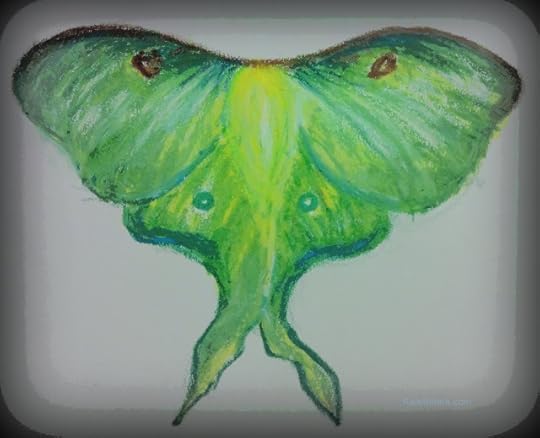 Oil pastel drawing by Kate BittersShe follows the sound of her own voice out the door and across the ragged lawn, into the first field and along the furrows separating the neat rows of corn by no more than a handful of inches. They grow the corn closer together now; the system demands a claustrophobic cluster of will-be food. Such proximity was impossible a few decades ago, now it’s the norm.
Oil pastel drawing by Kate BittersShe follows the sound of her own voice out the door and across the ragged lawn, into the first field and along the furrows separating the neat rows of corn by no more than a handful of inches. They grow the corn closer together now; the system demands a claustrophobic cluster of will-be food. Such proximity was impossible a few decades ago, now it’s the norm.
It’s the only way she’s known.
Her voice is singing, she realizes, and she can’t stop her feet from trailing the sound. It’s a clear, wordless melody and it lights a path through the darkening air. She follows it like a scuba diver’s breathing tube.
She read about scuba diving last year and has wanted to try it ever since. The thought that anyone with a little training and the right amount of cash can swim through the deepest parts of the ocean excites her. She dreams of blowfish, sharks, tangerine-colored coral, eels slithering into narrow crevices. She dreams of finding sunken ships and chests full of pirate gold. She wonders if it’s possible to live under the water, far away from sweaty-backed harvest seasons and dusty air.
The song continues from her throat and she crosses from field one into field two. Soybeans, now. It’s the start of the season and their leafy heads are just poking above the surface of the ground. She’s never understood why they grow soybeans. They’re tasteless, really. About as exciting as a piece of grass. “They go in a lot of products,” her father told her once. “Animal feed, mostly. And all that fancy tofu stuff you see at the co-op.”
“Why would we grow plants to feed other people’s animals? Why can’t they just eat grass, like Cady does?”
“Because they have a lot of Cadys, that’s why.” Her father shrugged. “I don’t know, honey. There’s a market for it, is all. We grow what people demand.”
The path between soybean rows is narrow and full of sod clusters and gopher holes (she spends a fleeting thought on the little rodents and wonders how they can survive among the field’s pesticide film), but her farm feet are sure. She follows the clear ringing of her voice until the field ends abruptly and she’s standing at the edge of the property, looking back.
The last note of her song lingers, fading softly like water soaking into a sponge.
She wipes a cheek, but only smears the dirt into the shape of raking fingers. “How did I get here?” she wonders aloud. She squints across the tops of the new corn and can just make out the tip of the farm house, the only home she’s known. She wriggles her toes inside leather boots and feels a lightness within her frame. Somewhere in the fields, she's shucked her cocoon, discarded it like a spring jacket. She imagines it, rough like wool, hanging on a corn stalk and bending it toward the ground. It was heavy. Awkward.
Now it is gone.
She rounds her shoulders forward and back, flexing the gauzy wings that rise from her back. They are a soft green—the same color as willow leaves—and made of a silken material that she can’t name.
She strokes the wings, dusts them off and picks off bits of woolen cocoon that cling to their fibers. It is dark now and a burst of stars sprays across the inky backdrop. She raises her chin and smiles.
With a stretch, a single determined flap, she flies.
 Kate Bitters is a freelance writer, marketer, and author of Elmer Left and Ten Thousand Lines. She is writing a story a week in 2015-2016 on the Bitter Blog. Subscribe to follow her journey.
Kate Bitters is a freelance writer, marketer, and author of Elmer Left and Ten Thousand Lines. She is writing a story a week in 2015-2016 on the Bitter Blog. Subscribe to follow her journey.
 Oil pastel drawing by Kate BittersShe follows the sound of her own voice out the door and across the ragged lawn, into the first field and along the furrows separating the neat rows of corn by no more than a handful of inches. They grow the corn closer together now; the system demands a claustrophobic cluster of will-be food. Such proximity was impossible a few decades ago, now it’s the norm.
Oil pastel drawing by Kate BittersShe follows the sound of her own voice out the door and across the ragged lawn, into the first field and along the furrows separating the neat rows of corn by no more than a handful of inches. They grow the corn closer together now; the system demands a claustrophobic cluster of will-be food. Such proximity was impossible a few decades ago, now it’s the norm. It’s the only way she’s known.
Her voice is singing, she realizes, and she can’t stop her feet from trailing the sound. It’s a clear, wordless melody and it lights a path through the darkening air. She follows it like a scuba diver’s breathing tube.
She read about scuba diving last year and has wanted to try it ever since. The thought that anyone with a little training and the right amount of cash can swim through the deepest parts of the ocean excites her. She dreams of blowfish, sharks, tangerine-colored coral, eels slithering into narrow crevices. She dreams of finding sunken ships and chests full of pirate gold. She wonders if it’s possible to live under the water, far away from sweaty-backed harvest seasons and dusty air.
The song continues from her throat and she crosses from field one into field two. Soybeans, now. It’s the start of the season and their leafy heads are just poking above the surface of the ground. She’s never understood why they grow soybeans. They’re tasteless, really. About as exciting as a piece of grass. “They go in a lot of products,” her father told her once. “Animal feed, mostly. And all that fancy tofu stuff you see at the co-op.”
“Why would we grow plants to feed other people’s animals? Why can’t they just eat grass, like Cady does?”
“Because they have a lot of Cadys, that’s why.” Her father shrugged. “I don’t know, honey. There’s a market for it, is all. We grow what people demand.”
The path between soybean rows is narrow and full of sod clusters and gopher holes (she spends a fleeting thought on the little rodents and wonders how they can survive among the field’s pesticide film), but her farm feet are sure. She follows the clear ringing of her voice until the field ends abruptly and she’s standing at the edge of the property, looking back.
The last note of her song lingers, fading softly like water soaking into a sponge.
She wipes a cheek, but only smears the dirt into the shape of raking fingers. “How did I get here?” she wonders aloud. She squints across the tops of the new corn and can just make out the tip of the farm house, the only home she’s known. She wriggles her toes inside leather boots and feels a lightness within her frame. Somewhere in the fields, she's shucked her cocoon, discarded it like a spring jacket. She imagines it, rough like wool, hanging on a corn stalk and bending it toward the ground. It was heavy. Awkward.
Now it is gone.
She rounds her shoulders forward and back, flexing the gauzy wings that rise from her back. They are a soft green—the same color as willow leaves—and made of a silken material that she can’t name.
She strokes the wings, dusts them off and picks off bits of woolen cocoon that cling to their fibers. It is dark now and a burst of stars sprays across the inky backdrop. She raises her chin and smiles.
With a stretch, a single determined flap, she flies.
 Kate Bitters is a freelance writer, marketer, and author of Elmer Left and Ten Thousand Lines. She is writing a story a week in 2015-2016 on the Bitter Blog. Subscribe to follow her journey.
Kate Bitters is a freelance writer, marketer, and author of Elmer Left and Ten Thousand Lines. She is writing a story a week in 2015-2016 on the Bitter Blog. Subscribe to follow her journey.
Published on November 11, 2015 09:53
November 7, 2015
52 Stories in 52 Weeks
Follow my blog with Bloglovin
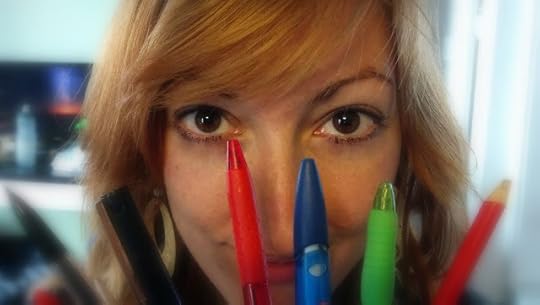
I have a confession to make: I haven’t been writing.
Sure, I’ve been doing my freelance stuff—writing blog posts, newsletters, and website copy for clients—but I haven’t been writing for myself. Putting pen to paper or hands on keyboard and just going for it. I’ve almost forgotten how it all works.
That’s what happens when you give up creative writing for a couple months: it becomes difficult. Words don’t effortlessly enter your brain; characters that you’ve developed lose their distinct voices. Even now, as I’m typing this blog post, I’m thinking, “Ugh. This writing is awful.”
Never mind. At least I’m writing. I’m starting over. I’m renewing my focus on my work, my words.
Some people think that creativity comes to writers in ethereal bursts—we wrangle it from the air and channel it onto paper. Sure, that might be true some days, but the majority of our creativity comes from doing, not waiting for something to happen that will prompt us into feverous fits of writing.
With this in mind, I’ve decided to stop waiting, to stop making excuses for my empty notepad. Sure, I’ve been busy (I’ve picked up two new clients in the past two months, started working on a new business plan, etc.), but I’ve also wasted a lot of time simply because I haven’t felt like writing.
Time to change my tune. This year, I’ve decided to compose a short story a week—52 short stories from November 2015 to November 2016—and put them up on my blog. Why make them public? So the world can hold me accountable for my goal. Even if only a handful of people end up reading my stories, I’ll still feel the pressure to create somethingeach week.
I’m not entirely shelving my current novel-in-progress (it’s been 2 ½ years of struggle…), but I know that it’s time to give myself a new focus, something to keep my writing sharp.
So, here goes. I’ve got my megaphone out and I’m shouting my intention to whoever is listening. I’m not sure what will spring out of my brain this coming year, but I’d love for you to join me on my journey. Subscribe (if you haven’t already) and see what happens. Let’s write.
Subscribe to The Bitter Blog!
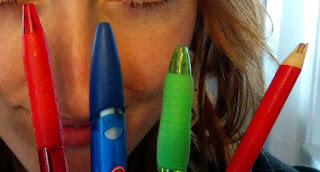

I have a confession to make: I haven’t been writing.
Sure, I’ve been doing my freelance stuff—writing blog posts, newsletters, and website copy for clients—but I haven’t been writing for myself. Putting pen to paper or hands on keyboard and just going for it. I’ve almost forgotten how it all works.
That’s what happens when you give up creative writing for a couple months: it becomes difficult. Words don’t effortlessly enter your brain; characters that you’ve developed lose their distinct voices. Even now, as I’m typing this blog post, I’m thinking, “Ugh. This writing is awful.”
Never mind. At least I’m writing. I’m starting over. I’m renewing my focus on my work, my words.
Some people think that creativity comes to writers in ethereal bursts—we wrangle it from the air and channel it onto paper. Sure, that might be true some days, but the majority of our creativity comes from doing, not waiting for something to happen that will prompt us into feverous fits of writing.
With this in mind, I’ve decided to stop waiting, to stop making excuses for my empty notepad. Sure, I’ve been busy (I’ve picked up two new clients in the past two months, started working on a new business plan, etc.), but I’ve also wasted a lot of time simply because I haven’t felt like writing.
Time to change my tune. This year, I’ve decided to compose a short story a week—52 short stories from November 2015 to November 2016—and put them up on my blog. Why make them public? So the world can hold me accountable for my goal. Even if only a handful of people end up reading my stories, I’ll still feel the pressure to create somethingeach week.
I’m not entirely shelving my current novel-in-progress (it’s been 2 ½ years of struggle…), but I know that it’s time to give myself a new focus, something to keep my writing sharp.
So, here goes. I’ve got my megaphone out and I’m shouting my intention to whoever is listening. I’m not sure what will spring out of my brain this coming year, but I’d love for you to join me on my journey. Subscribe (if you haven’t already) and see what happens. Let’s write.
Subscribe to The Bitter Blog!

Published on November 07, 2015 11:51
September 8, 2015
Be a Galapagos Finch
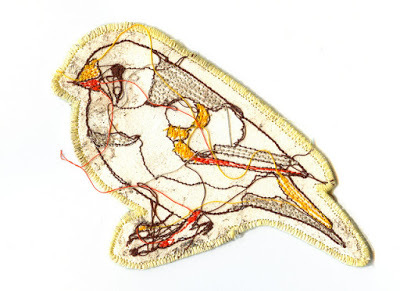 Needlepoint Finch. Photo courtesy of Marloes Duyker
Needlepoint Finch. Photo courtesy of Marloes DuykerI listen to RadioLab. A lot.
This past summer I've been digging my way through the archives, listening to episode after episode. Some of the freelance work I do is passive (i.e. taking photographs of textiles or whipping up simple graphics), so I keep myself company with a good podcast. Part of the reason I've velcroed myself to RadioLab is because of the brain-tickling topics that often call believe systems into question or approach a familiar topic with a fresh perspective. But another reason I listen is the hosts. Something about Jad Abumrad's inquisitiveness and Robert Krulwich's soothing voice makes me want to hang out with them at a bar and talk about life's big questions.
So, where do the Galapagos finches fit into all this?
RadioLab ran an episode on Galapagos that touches on some of the big questions and mysteries that surround the archipelago (If you get a chance, I highly recommend listening to the entire thing). I was immediately drawn into this particular episode because I studied in Ecuador and had the opportunity to visit this miraculous set of islands. When they began talking about the endangered finches, I had a visceral reaction.
My stomach knotted up and my lungs tightened. I could picture the sweet little birds; I could hear their songs fluttering through the trees. It made me incredibly depressed to think that those songs might be silenced one day soon.
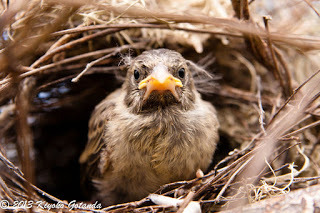 As I listened to this episode of RadioLab, Jad and Robert began to paint a grim picture of the finch's plight. An invasive species of fly was swiftly desiccating the finch population by laying its eggs in their nests--eggs that would become larva, larva that feeds on baby finches from the inside out. The Galapagos islands are a sensitive area (untouched for centuries by man or any kind of non-endemic species). When an outside species is introduced, the natives usually fare poorly. This was the case with tortoises and goats. When goats were introduced to the islands, tortoise populations plummeted. The goats competed for resources, gobbling up grass and shrubs, leaving behind dust bowls, devoid of vegetation.
As I listened to this episode of RadioLab, Jad and Robert began to paint a grim picture of the finch's plight. An invasive species of fly was swiftly desiccating the finch population by laying its eggs in their nests--eggs that would become larva, larva that feeds on baby finches from the inside out. The Galapagos islands are a sensitive area (untouched for centuries by man or any kind of non-endemic species). When an outside species is introduced, the natives usually fare poorly. This was the case with tortoises and goats. When goats were introduced to the islands, tortoise populations plummeted. The goats competed for resources, gobbling up grass and shrubs, leaving behind dust bowls, devoid of vegetation.So, what's a poor finch to do when a flesh-eating fly is wiping out most of the hatchlings? Adapt.
Seriously. These finches have adapted in less than fifteen years. This is almost unheard of in evolutionary terms. Usually, a slow process of natural selection leads to the evolution of a species, but these finches appear to be evolving in real time. Pushed to the brink (five species of finches are in critical danger of extinction and six other species are in serious decline), the finches fought back.
Mother finches developed the skill to identify and eliminate larva from their nests. They even began eating them, which they would have never done fifteen years ago (scientists experimented with feeding adult finches fly larva in the year 2000 and had little success). Additionally, baby finches are beginning to climb up the nest walls to position themselves away from the larva at the bottom--an act that was never witnessed until recently.
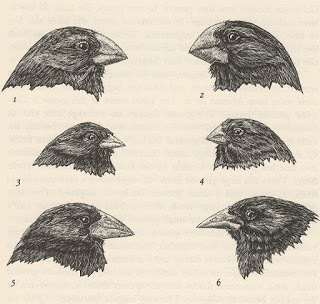 Perhaps the most amazing adaptation of all is that different species of finches have begun to interbreed. This action defies the very definition of a species: under normal circumstances, animals do NOT breed outside their species.But the Galapagos finches were desperate. On Floreana island, the critically endangered medium tree finch began breeding with the small tree finch. They crossed a boundary that had been in place for hundreds of years for the sake of saving their species. A hybrid emerged. The new, cross-breed finch was better at combating fly larva and more likely to survive into adulthood. Even the song of the two species of finches began blending together (there's something poetic about that, isn't there?).
Perhaps the most amazing adaptation of all is that different species of finches have begun to interbreed. This action defies the very definition of a species: under normal circumstances, animals do NOT breed outside their species.But the Galapagos finches were desperate. On Floreana island, the critically endangered medium tree finch began breeding with the small tree finch. They crossed a boundary that had been in place for hundreds of years for the sake of saving their species. A hybrid emerged. The new, cross-breed finch was better at combating fly larva and more likely to survive into adulthood. Even the song of the two species of finches began blending together (there's something poetic about that, isn't there?).These finches are a lesson in survival and adaptation. Their situation seemed hopeless, but they fought through it and emerged stronger and better-equipped to deal with the perils of their world. We can learn from this tenacity, this will to survive. When the chips are down, don't walk away; don't give up. Devise a new strategy and get back in the game.
Be a Galapagos finch.
Kate Bitters is a freelance writer and marketer. Her latest novel, Ten Thousand Lines, is a dystopian tale about a revolution, a witch hunt, and an unlikely friendship.
Published on September 08, 2015 10:52
September 1, 2015
What $2 Can Get You (Plus, an eBook Sale!)
Hello friends and readers! Wednesday the 2nd marks the first day of a four-day eBook sale for Ten Thousand Lines. You can snap it up for a mere $1.99 from now until Saturday. What can $2 get you these days?
 -A pack of gum
-A pack of gum-3/4 of a gallon of gas
-A Wendy's cheeseburger
-Vending machine fruit snacks
-Suave shampoo
-8 gumballs
-2 postage stamps
-A candle
-37% of a McDonald's premium southwest salad
-One ticket on the MSP Light Rail
-A package of shirt buttons
-A scratch-off lotto ticket
-5 colored photo copies at Staples (seriously!)
-A package of basil seeds at Target
-1/7 of a cocktail at Marvel Bar
Why not pay $2 and enjoy some literature? I dare you. Splurge!
Check out Ten Thousand Lines today :)
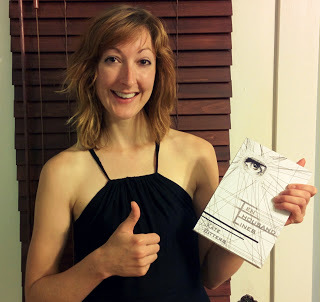
Published on September 01, 2015 15:52
August 5, 2015
Space to Think
This past weekend, I found myself in the Badlands of North Dakota in 100 degree heat. As my partner-in-crime rode the 50 mile Maah Daah Hey bike race, I went for a 12 mile hike. Crazy? Maybe. Worth it? Absolutely.

I trekked through a petrified forest, stunningly stark landscapes, and near-dry creek beds. I ventured from the trail and bushwhacked my way through 3-4 miles. I saw prairie dogs (hundreds), bison, wild horses, a gigantic elk, a fox that had just made a kill, some grouse, and a red-tailed hawk. Mostly, I thought.
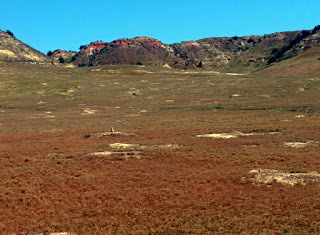 Being in the middle of nowhere is great for stimulating creative thought. The trick is to not try too hard; let the thoughts come to you as they will. This is something I've learned through meditation instruction--let your thoughts pass through you like clouds.
Being in the middle of nowhere is great for stimulating creative thought. The trick is to not try too hard; let the thoughts come to you as they will. This is something I've learned through meditation instruction--let your thoughts pass through you like clouds.
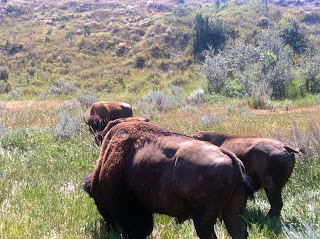 Sometimes you'll come up with brilliant ideas (for me, I often envision potential story scenes or even entire plot lines when I'm walking around aimlessly), and sometimes you'll think of nothing. On the days I think of nothing fresh/new/original, I try not to worry. At the very least I've primed my mind to receive new thoughts and ideas. I always capture some serenity through my treks that helps me fret less about day-to-day life and focus more on creative energy.
Sometimes you'll come up with brilliant ideas (for me, I often envision potential story scenes or even entire plot lines when I'm walking around aimlessly), and sometimes you'll think of nothing. On the days I think of nothing fresh/new/original, I try not to worry. At the very least I've primed my mind to receive new thoughts and ideas. I always capture some serenity through my treks that helps me fret less about day-to-day life and focus more on creative energy.
The main lessons: Get away. Be by yourself. Don't be afraid to turn your brain off for a while. And always keep a pen and paper handy (you never know what might pop into your head).
-Kate
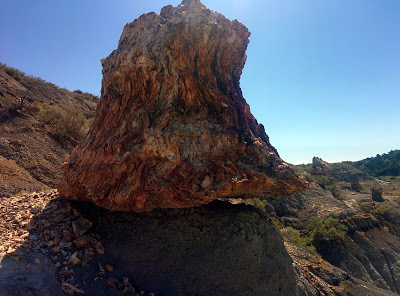

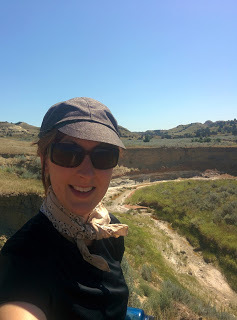


I trekked through a petrified forest, stunningly stark landscapes, and near-dry creek beds. I ventured from the trail and bushwhacked my way through 3-4 miles. I saw prairie dogs (hundreds), bison, wild horses, a gigantic elk, a fox that had just made a kill, some grouse, and a red-tailed hawk. Mostly, I thought.
 Being in the middle of nowhere is great for stimulating creative thought. The trick is to not try too hard; let the thoughts come to you as they will. This is something I've learned through meditation instruction--let your thoughts pass through you like clouds.
Being in the middle of nowhere is great for stimulating creative thought. The trick is to not try too hard; let the thoughts come to you as they will. This is something I've learned through meditation instruction--let your thoughts pass through you like clouds. Sometimes you'll come up with brilliant ideas (for me, I often envision potential story scenes or even entire plot lines when I'm walking around aimlessly), and sometimes you'll think of nothing. On the days I think of nothing fresh/new/original, I try not to worry. At the very least I've primed my mind to receive new thoughts and ideas. I always capture some serenity through my treks that helps me fret less about day-to-day life and focus more on creative energy.
Sometimes you'll come up with brilliant ideas (for me, I often envision potential story scenes or even entire plot lines when I'm walking around aimlessly), and sometimes you'll think of nothing. On the days I think of nothing fresh/new/original, I try not to worry. At the very least I've primed my mind to receive new thoughts and ideas. I always capture some serenity through my treks that helps me fret less about day-to-day life and focus more on creative energy.The main lessons: Get away. Be by yourself. Don't be afraid to turn your brain off for a while. And always keep a pen and paper handy (you never know what might pop into your head).
-Kate




Published on August 05, 2015 21:13
July 21, 2015
The Haircut Incident (On impulsivity and taking risks)
Today I cut my hair.
Ok, ok. I realize that's not big news. Thousands of people get haircuts every day. But this was a little different. My thought process went something like this:
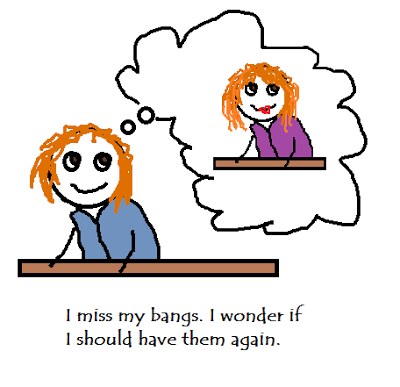
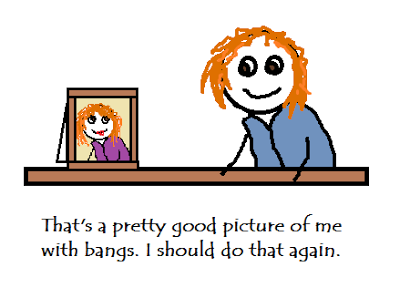
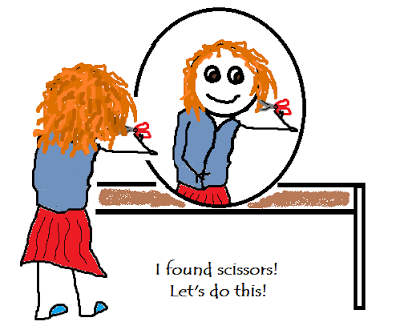
Sure, this was a small, simple act. Yes, hair grows back. But it was thrilling nonetheless. I unearthed a part of myself I've missed--the reckless, impulsive part.
When I was a little younger, I'd dream up things and do them. When I lived in Portland, Oregon, I decided I wanted to drive to California one night. It was 9:30 p.m. at night and I was in the middle of the city when I had the impulse. I was having a rough day and a long drive seemed like just the ticket for climbing my way out of melancholy.
I walked over to my car and paused. I had a couple granola bars, a sleeping bag in the trunk, and a road map (this was before the days of GPS in every cell phone). I thought to myself as I opened the map, "I wonder how hard it is to get to California."
Turns out, not very hard.
I spent the next 24 hours driving along the Cali coast and into the redwood forest. I sang to myself in the car, journaled, and ate gas station food. I returned to Portland with a grin and a revitalized spirit.
Unfortunately, growing up inevitably means shedding some of that impulsivity. There are bills to pay, pets and kids to care for, meetings to attend. It's difficult for the typical person to hop in a car and drive away for a while.
But that doesn't mean we have to lose our impulsivity entirely. We don't have to become increasingly afraid of the unknown and foreign. It's easy, as an adult, to stay comfortably within our boxes, only socializing with close friends and family, only traveling to "safe" places with plush hotel room beds and chlorinated swimming pools.
I argue that living strictly within the confines of our comfort zone stagnates growth. We miss opportunities to learn, grow, and experience. We miss out on making mistakes and solving problems. We lose our ability to think on our feet.
So, maybe it's impossible to hop on a plane tomorrow to visit Fiji...but that doesn't mean you can't hop on that plane next month.
Here's to a healthy dose of recklessness and discovering new parts of yourself along the way!
-Kate
 I'm liking my impulsive haircut!
I'm liking my impulsive haircut!
Ok, ok. I realize that's not big news. Thousands of people get haircuts every day. But this was a little different. My thought process went something like this:



Sure, this was a small, simple act. Yes, hair grows back. But it was thrilling nonetheless. I unearthed a part of myself I've missed--the reckless, impulsive part.
When I was a little younger, I'd dream up things and do them. When I lived in Portland, Oregon, I decided I wanted to drive to California one night. It was 9:30 p.m. at night and I was in the middle of the city when I had the impulse. I was having a rough day and a long drive seemed like just the ticket for climbing my way out of melancholy.
I walked over to my car and paused. I had a couple granola bars, a sleeping bag in the trunk, and a road map (this was before the days of GPS in every cell phone). I thought to myself as I opened the map, "I wonder how hard it is to get to California."
Turns out, not very hard.
I spent the next 24 hours driving along the Cali coast and into the redwood forest. I sang to myself in the car, journaled, and ate gas station food. I returned to Portland with a grin and a revitalized spirit.
Unfortunately, growing up inevitably means shedding some of that impulsivity. There are bills to pay, pets and kids to care for, meetings to attend. It's difficult for the typical person to hop in a car and drive away for a while.
But that doesn't mean we have to lose our impulsivity entirely. We don't have to become increasingly afraid of the unknown and foreign. It's easy, as an adult, to stay comfortably within our boxes, only socializing with close friends and family, only traveling to "safe" places with plush hotel room beds and chlorinated swimming pools.
I argue that living strictly within the confines of our comfort zone stagnates growth. We miss opportunities to learn, grow, and experience. We miss out on making mistakes and solving problems. We lose our ability to think on our feet.
So, maybe it's impossible to hop on a plane tomorrow to visit Fiji...but that doesn't mean you can't hop on that plane next month.
Here's to a healthy dose of recklessness and discovering new parts of yourself along the way!
-Kate
 I'm liking my impulsive haircut!
I'm liking my impulsive haircut!
Published on July 21, 2015 23:17



